UNITED STATES
SECURITIES AND EXCHANGE COMMISSION
Washington, D.C. 20549
FORM N-CSR
CERTIFIED SHAREHOLDER REPORT OF
REGISTERED
MANAGEMENT INVESTMENT COMPANIES
Investment Company Act File Number: 811-02958
| T. Rowe Price International Funds, Inc. |
|
|
| (Exact name of registrant as specified in charter) |
| 100 East Pratt Street, Baltimore, MD 21202 |
|
|
| (Address of principal executive offices) |
| David Oestreicher |
| 100 East Pratt Street, Baltimore, MD 21202 |
|
|
| (Name and address of agent for service) |
Registrant’s telephone number, including area code: (410) 345-2000
Date of fiscal year end: December 31
Date of reporting period: December 31, 2020
 |
|
Emerging Markets Bond Fund |
December 31, 2020 |
| PREMX | Investor Class |
| PAIKX | Advisor Class |
| PRXIX | I Class |
| TREZX | Z Class |
| T. ROWE PRICE EMERGING MARKETS BOND FUND |
|
|
HIGHLIGHTS
| ■ | The Emerging Markets Bond Fund underperformed its benchmark and the Lipper peer group for the 12 months ended December 31, 2020. |
| ■ | The fund’s security selection decisions detracted from relative returns, while country allocations were neutral. |
| ■ | The portfolio remains underweight lower-yielding markets that provide limited relative value, such as China and the Philippines, in favor of higher-yielding countries that offer better opportunities for risk-adjusted return, including Ukraine and Ghana. |
| ■ | While the global economic slowdown and health care crisis have weighed on fundamentals in emerging markets, we remain encouraged by the fiscal and monetary steps taken by both developed and emerging nations to support the recovery in global economic activity. |
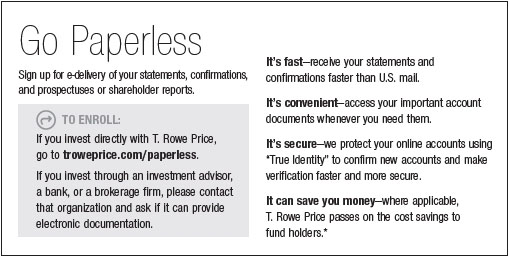
Log in to your account at troweprice.com for more information.
*Certain mutual fund accounts that are assessed an annual account service fee can also save money by switching to e-delivery.
CIO Market Commentary
Dear Shareholder
Nearly all major stock and bond indexes produced positive results during 2020 as markets recovered from the steep sell-off that resulted from the spread of the coronavirus. Extraordinary fiscal and monetary support from global governments and central banks helped spur the rebound, although the pandemic continued to pose significant public health and economic challenges as the year came to an end.
In the U.S., the large-cap Dow Jones Industrial Average and S&P 500 Index reached record highs, as did the technology-heavy Nasdaq Composite Index—a result that few would have predicted in late March after the benchmarks tumbled more than 30% as governments instituted lockdowns to try to halt the spread of the virus. Large-cap information technology and internet-related firms helped lead the rebound as they benefited from the work-from-home environment and an acceleration in demand for online services.
Within the S&P 500, the technology and consumer discretionary sectors were the top performers, and communication services and materials stocks also outperformed. Despite a late rally, the energy sector trailed with significant losses due to a plunge in oil prices.
Most equity markets outside the U.S. also performed well. Emerging markets outpaced developed markets, and Asian shares delivered strong results as China and other countries in the region proved relatively successful in containing the coronavirus.
Growth stocks significantly outpaced their value counterparts for the full year; however, value shares rallied late in the period. Positive vaccine news in November raised hopes for a return to normalcy in 2021 and boosted sectors that had been beaten down in the initial phases of the pandemic.
Within the fixed income universe, corporate bonds delivered strong results as the market easily absorbed a torrent of new issuance. After falling to record lows in March, intermediate- and longer-term Treasury yields ticked higher later in the year but remained very low by historical standards, a factor that encouraged investors to seek out riskier securities with higher return potential.
While investors had reason to cheer the market’s recovery, the global economic outlook remained unclear as the year came to an end. Most notable on the positive side was the start of vaccine distributions, which provided hope that the pandemic was in its final phase. In addition, Congress passed a $900 billion coronavirus relief package, supplementing the $2.4 trillion allocated to address the crisis earlier in the year, and the Fed continued to pledge very accommodative monetary policies for the foreseeable future. Meanwhile, political uncertainty diminished with Joe Biden’s victory in the U.S. presidential election and the completion of a Brexit trade deal between the UK and the European Union.
On the negative side, concerns about a resurgence in virus hospitalizations led to new lockdowns and business restrictions in many countries, which in turn appeared to threaten economic recoveries. In the U.S., after a strong recovery in the summer and fall, the pace of hiring slowed late in the year, and household spending declined in November for the first time since April.
It was a remarkable 12-month period in many ways, but as far as markets are concerned, I can recall no calendar year that so starkly displayed evidence of both fear and greed. Fear emerged during the March sell-off and again in April as oil futures briefly traded in negative territory. Greed surfaced later as some assets seemed to continue to rally without fundamental support. Bitcoin rocketed to a record high of $29,000 by year-end, and the amount of money raised by initial public offerings also climbed to historic levels. While valuations are still attractive in some areas of the market, other sectors appear to have already priced in a strong rebound in earnings and are trading at elevated levels.
There are both risks and potential rewards in this environment, and we believe strong fundamental analysis and skilled active security selection will remain critical components of investment success.
Thank you for your continued confidence in T. Rowe Price.
Sincerely,

Robert Sharps
Group Chief Investment Officer
Management’s Discussion of Fund Performance
INVESTMENT OBJECTIVE
The fund seeks to provide high income and capital appreciation.
FUND COMMENTARY
How did the fund perform in the past 12 months?
The T. Rowe Price Emerging Markets Bond Fund returned 4.62% for the 12 months ended December 31, 2020, underperforming the benchmark J.P. Morgan Emerging Markets Bond Index Global and the Lipper peer group average. (Results for Advisor, I, and Z Class shares varied slightly, reflecting their different fee structures and inception dates. Past performance cannot guarantee future results.)
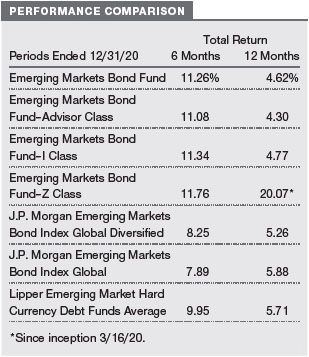
What factors influenced the fund’s performance?
Early in the period, investors rushed to safe-haven assets, including cash, as governments took extraordinary steps to halt the spread of the coronavirus, leading to significant outflows from emerging markets as forced sellers liquidated positions. The abrupt change in risk sentiment adversely affected high yield credits, in particular, regardless of fundamentals. Exceptional actions taken by global central banks led to a sharp reversal, with investors eagerly adding risk.
The fund’s country allocation decisions were modestly positive for the year. Positioning in Ecuador around periods of extreme volatility was beneficial. Following sharp declines and a default earlier in the period, when our underweight allocation was beneficial, Ecuador’s relative value became more appealing. We were able to build an overweight position at lower prices, which was helpful during the partial recovery. Ecuador completed its restructuring, which was well received, near the end of the year. Reduced exposure to Lebanon added to relative performance. The distressed issuer was down sharply as investor demand shifted suddenly to safe-haven assets. The heavily indebted sovereign defaulted on its debt for the first time and continues to experience significant political instability. Overweight allocations to higher-conviction frontier countries Ghana, Ukraine, Jamaica, and Egypt provided a boost to results as their higher yields were in demand for most of the year.
On the other hand, our overweight allocation to Sri Lanka weighed on relative results, though our selection of shorter-maturity bonds performed better. The frontier sovereign underperformed as it remained pressured by a shock to its economy due to coronavirus shutdowns as well as extensive external debt needs. Underweight allocations to higher-quality sovereigns—such as Saudi Arabia, Qatar, Russia, and Chile—held back relative results as they outperformed amid bouts of market volatility and declining U.S. interest rates early in the year.
Security selection was a drag on relative returns. The portfolio’s off-benchmark allocation to Venezuela held back results. The sanctioned bonds trade in very small volumes and have been eliminated from the index, yet mark-to-market pricing is ongoing. We see long-term upside potential in an eventual restructuring, as there are significant assets backing these low-dollar-priced bonds. Ongoing volatility is anticipated until a normal market resumes. Our selection of Chilean airline LATAM Airlines was negative as it declined under pressure from travel restrictions and filed for bankruptcy during the second quarter. Within Brazil, corporate issuer Azul Airlines declined amid travel restrictions stemming from coronavirus containment measures. Similarly, our selection of steel producer Companhia Siderurgica Nacional underperformed amid tepid demand. The selection of high-quality Israeli corporates Israel Electric and Israel Chemicals, however, supported relative performance, as they performed well during market volatility. (Please refer to the fund’s portfolio of investments for a complete list of holdings and the amount each represents in the portfolio.)
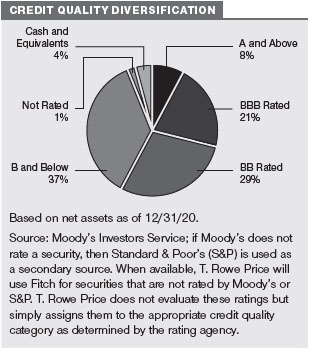
The fund’s small exposure to emerging markets currencies was a slight detraction from performance. The Brazilian real lost ground as the country struggled with the coronavirus and political tensions over fiscal spending. The Egyptian pound, however, gained as the country’s local bonds offer high yields, and foreign investment has picked up. The portfolio’s duration was somewhat shorter than the duration of the benchmark for most of the reporting period, which modestly detracted from relative returns as base rates generally decreased. (Duration measures a bond’s sensitivity to changes in interest rates.)
The portfolio maintains allocations to select types of derivatives for hedging purposes or to gain exposure to certain currencies or countries. The fund held currency forward contracts during the reporting period, which had a positive impact on performance. The fund also held interest rate derivatives that further supported performance.
How is the fund positioned?
The portfolio remains underweight the lowest-yielding markets that are highly correlated to U.S. Treasuries, provide low income, and offer limited room for capital appreciation, such as China, the Philippines, and recent index inclusions from the Gulf Cooperation Council (GCC). We have added to high-quality GCC countries Saudi Arabia, Qatar, and the United Arab Emirates, as they provide diversification benefits and are supported by normalizing oil prices and local buyer bases. We are overweight higher-yielding countries that offer better opportunities for risk-adjusted returns, particularly idiosyncratic stories with positive reform momentum, such as Egypt and Ghana, which became notable overweight positions during the year. The countries’ bonds sold off sharply in the first quarter and offered very attractive yields relative to macroeconomic fundamentals and maturity schedules. These cases represent a philosophical style bias in how we manage the portfolio rather than tactical positioning decisions.
We maintain a meaningful allocation to off-benchmark emerging markets corporate bonds, though we reduced this allocation slightly over the year. While we think that corporate debt is well positioned to benefit from accelerating growth, we are also mindful that emerging markets corporate bonds are generally less liquid than government debt. Within the emerging markets corporate segment, we tend to favor quasi-sovereign issuers, such as Brazil’s Petrobras and Mexico’s Petroleos Mexicanos (PEMEX), because they are generally more liquid than traditional corporates and provide similar links to underlying growth trends.
In terms of tactical risk exposure in the portfolio, we added to select high-conviction, high-beta positions toward the end of the first quarter as selling pressure on the asset class during the crisis created attractive valuations. To balance these additions, we reduced exposures to countries with deteriorating fundamental trajectories, such as Brazil, South Africa, and Turkey. We remained structurally underweight lower-yielding countries, such as China, Panama, and the Philippines, on reduced relative value. However, we added exposure to some defensive GCC issuers, which provided good liquidity, particularly later in the period after asset class valuations moderated significantly.
The fund at times holds small amounts of local currency-denominated sovereign bonds and local currencies where the relative value appears compelling versus debt denominated in U.S. dollars. At the end of the period, total local currency exposure net of currency hedging accounted for about 2% of the portfolio. Depending on our outlook for a particular currency and the costs involved, we may fully or partially hedge the currency exposure to reduce risk or opt not to hedge if a currency appears to be poised to gain against the dollar.
What is portfolio management’s outlook?
While the global economic slowdown and health care crisis have weighed on fundamentals in emerging markets, we remain encouraged by the fiscal and monetary steps taken by both developed and emerging nations to support the recovery in global economic activity. Some of the more fragile countries are likely to remain impaired, but most countries should weather the storm and continue to rebound in 2021.
The technical environment has been supportive, with positive fund inflows and a healthy level of new supply. Furthermore, as one of the highest-yielding fixed income asset classes, emerging markets debt should continue to attract investors in an environment of record-low global yields and elevated equity valuations.
However, valuations have continued to moderate in recent months, and the global economic recovery remains fragile in light of the persisting coronavirus risk. Moreover, future rising inflation and interest rates are potential concerns. As a result, our current outlook and posture is relatively neutral, though we still out carry our benchmark.
In this uncertain environment, we believe that the extended reach of T. Rowe Price’s global credit, sovereign, and equity research platforms—combined with our emphasis on collaboration across those platforms—gives us a critical edge in analyzing both risks and opportunities in emerging markets debt.
The views expressed reflect the opinions of T. Rowe Price as of the date of this report and are subject to change based on changes in market, economic, or other conditions. These views are not intended to be a forecast of future events and are no guarantee of future results.
RISKS OF INTERNATIONAL BOND INVESTING
Funds that invest overseas generally carry more risk than funds that invest strictly in U.S. assets, including unpredictable changes in currency values. Investments in emerging markets are subject to abrupt and severe price declines and should be regarded as speculative. The economic and political structures of developing nations, in most cases, do not compare favorably with the U.S. or other developed countries in terms of wealth and stability, and their financial markets often lack liquidity. Some countries also have legacies of hyperinflation, currency devaluations, and governmental interference in markets.
International investments are subject to currency risk, a decline in the value of a foreign currency versus the U.S. dollar, which reduces the dollar value of securities denominated in that currency. The overall impact on a fund’s holdings can be significant and long lasting depending on the currencies represented in the portfolio, how each one appreciates or depreciates in relation to the U.S. dollar, and whether currency positions are hedged. Further, exchange rate movements are unpredictable, and it is not possible to effectively hedge the currency risks of many developing countries.
Bonds are also subject to interest rate risk, the decline in bond prices that usually accompanies a rise in interest rates, and credit risk, the chance that any fund holding could have its credit rating downgraded or that a bond issuer will default (fail to make timely payments of interest or principal), potentially reducing the fund’s income level and share price.
BENCHMARK INFORMATION
Note: Information has been obtained from sources believed to be reliable but J.P. Morgan does not warrant its completeness or accuracy. The index is used with permission. The index may not be copied, used, or distributed without J.P. Morgan’s prior written approval. Copyright 2021, J.P. Morgan Chase & Co. All rights reserved.
Note: Lipper, a Thomson Reuters Company, is the source for all Lipper content reflected in these materials. Copyright 2021 © Refinitiv. All rights reserved. Any copying, republication or redistribution of Lipper content is expressly prohibited without the prior written consent of Lipper. Lipper shall not be liable for any errors or delays in the content, or for any actions taken in reliance thereon.
GROWTH OF $10,000
This chart shows the value of a hypothetical $10,000 investment in the fund over the past 10 fiscal year periods or since inception (for funds lacking 10-year records). The result is compared with benchmarks, which include a broad-based market index and may also include a peer group average or index. Market indexes do not include expenses, which are deducted from fund returns as well as mutual fund averages and indexes.
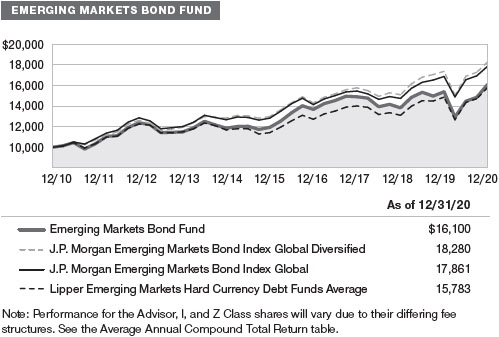
AVERAGE ANNUAL COMPOUND TOTAL RETURN
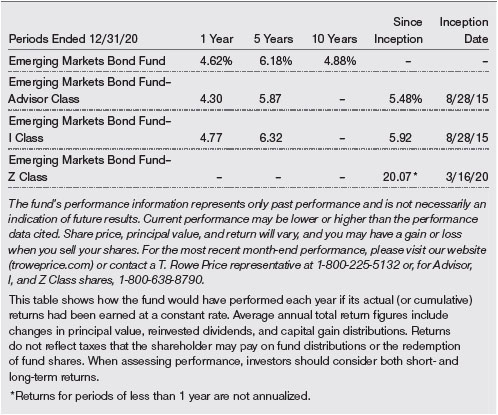
EXPENSE RATIO
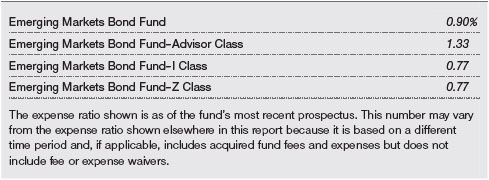
FUND EXPENSE EXAMPLE
As a mutual fund shareholder, you may incur two types of costs: (1) transaction costs, such as redemption fees or sales loads, and (2) ongoing costs, including management fees, distribution and service (12b-1) fees, and other fund expenses. The following example is intended to help you understand your ongoing costs (in dollars) of investing in the fund and to compare these costs with the ongoing costs of investing in other mutual funds. The example is based on an investment of $1,000 invested at the beginning of the most recent six-month period and held for the entire period.
Please note that the fund has three share classes: The original share class (Investor Class) charges no distribution and service (12b-1) fee, Advisor Class shares are offered only through unaffiliated brokers and other financial intermediaries and charge a 0.25% 12b-1 fee, I Class shares are available to institutionally oriented clients and impose no 12b-1 or administrative fee payment, and Z Class shares are offered only to funds advised by T. Rowe Price and other advisory clients of T. Rowe Price or its affiliates that are subject to a contractual fee for investment management services and impose no 12b-1 fee or administrative fee payment. Each share class is presented separately in the table.
Actual Expenses
The first line of the following table (Actual) provides information about actual account values and expenses based on the fund’s actual returns. You may use the information on this line, together with your account balance, to estimate the expenses that you paid over the period. Simply divide your account value by $1,000 (for example, an $8,600 account value divided by $1,000 = 8.6), then multiply the result by the number on the first line under the heading “Expenses Paid During Period” to estimate the expenses you paid on your account during this period.
Hypothetical Example for Comparison Purposes
The information on the second line of the table (Hypothetical) is based on hypothetical account values and expenses derived from the fund’s actual expense ratio and an assumed 5% per year rate of return before expenses (not the fund’s actual return). You may compare the ongoing costs of investing in the fund with other funds by contrasting this 5% hypothetical example and the 5% hypothetical examples that appear in the shareholder reports of the other funds. The hypothetical account values and expenses may not be used to estimate the actual ending account balance or expenses you paid for the period.
Note: T. Rowe Price charges an annual account service fee of $20, generally for accounts with less than $10,000. The fee is waived for any investor whose T. Rowe Price mutual fund accounts total $50,000 or more; accounts electing to receive electronic delivery of account statements, transaction confirmations, prospectuses, and shareholder reports; or accounts of an investor who is a T. Rowe Price Personal Services or Enhanced Personal Services client (enrollment in these programs generally requires T. Rowe Price assets of at least $250,000). This fee is not included in the accompanying table. If you are subject to the fee, keep it in mind when you are estimating the ongoing expenses of investing in the fund and when comparing the expenses of this fund with other funds.
You should also be aware that the expenses shown in the table highlight only your ongoing costs and do not reflect any transaction costs, such as redemption fees or sales loads. Therefore, the second line of the table is useful in comparing ongoing costs only and will not help you determine the relative total costs of owning different funds. To the extent a fund charges transaction costs, however, the total cost of owning that fund is higher.
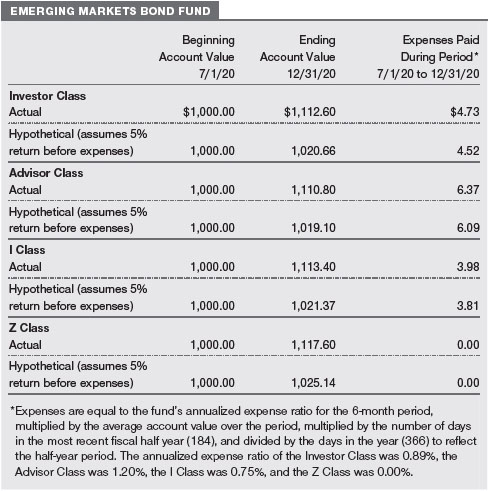
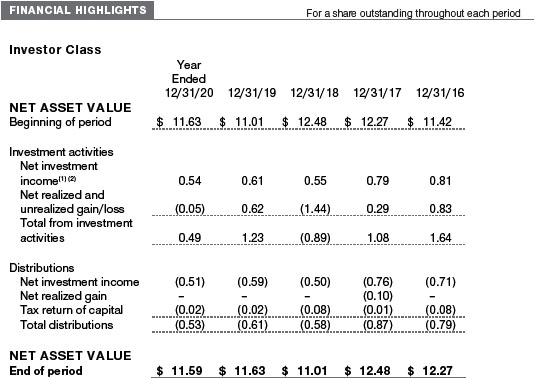
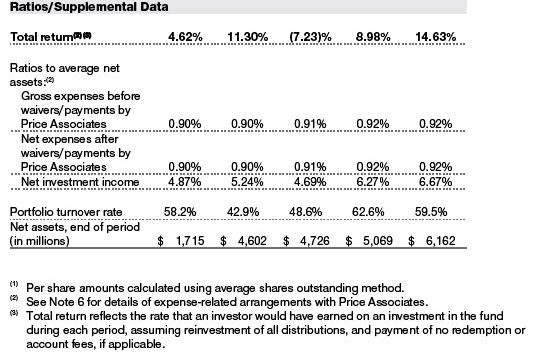
The accompanying notes are an integral part of these financial statements.
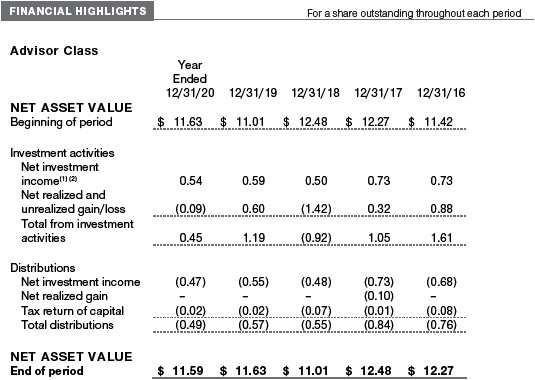
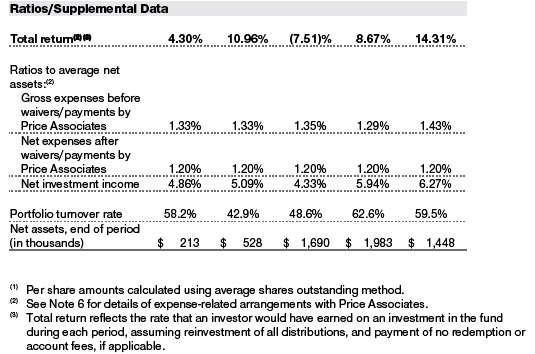
The accompanying notes are an integral part of these financial statements.
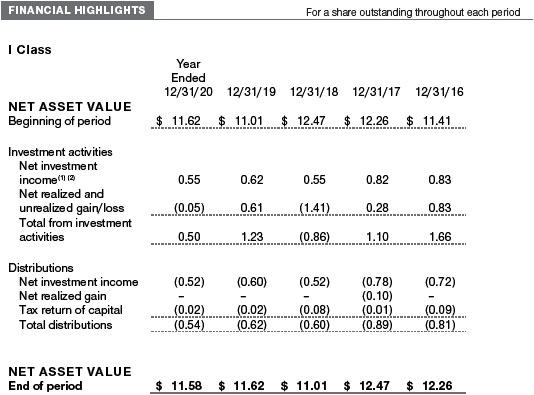
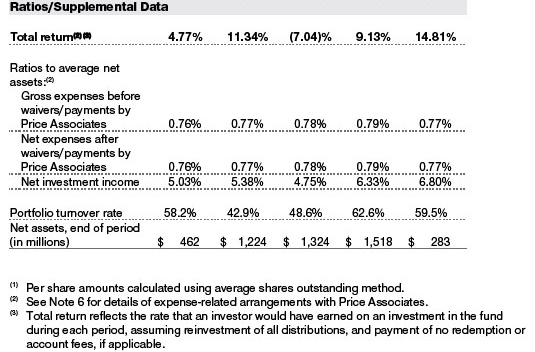
The accompanying notes are an integral part of these financial statements.
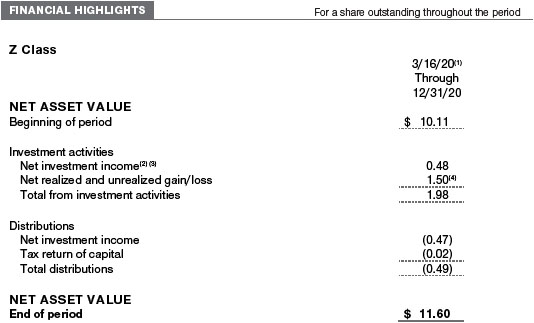
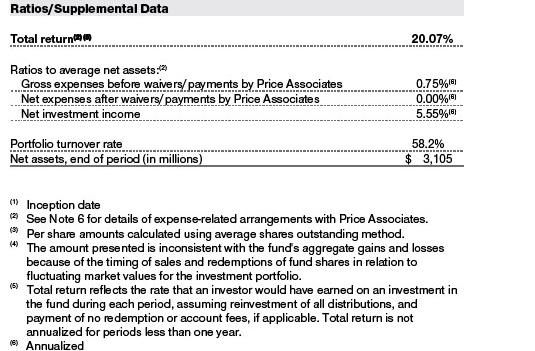
The accompanying notes are an integral part of these financial statements.
December 31, 2020
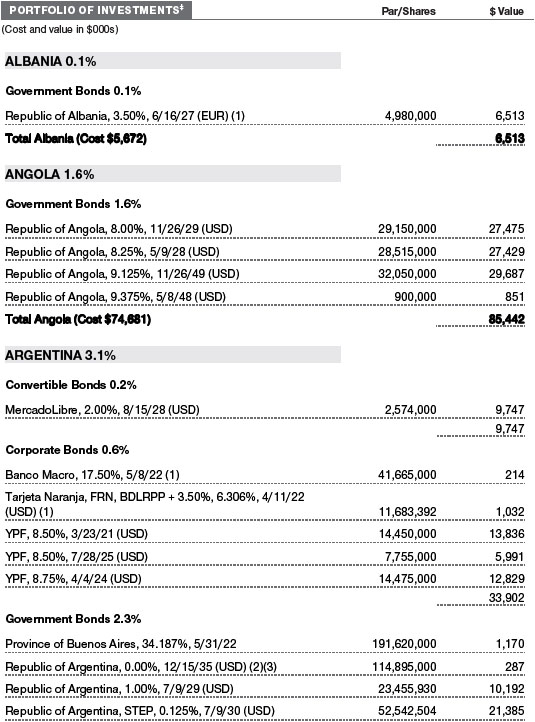
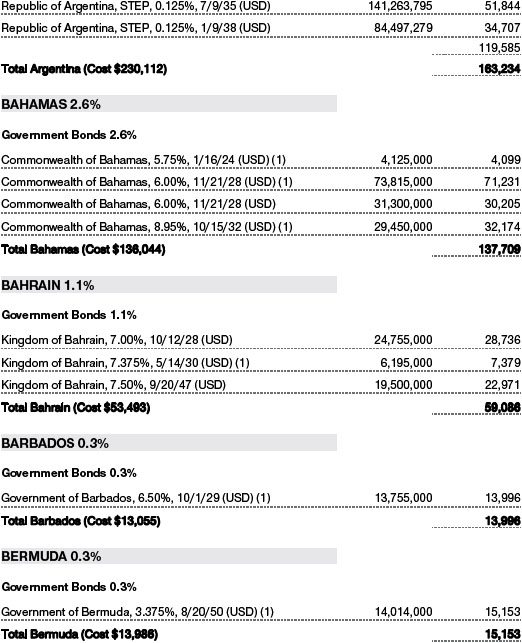
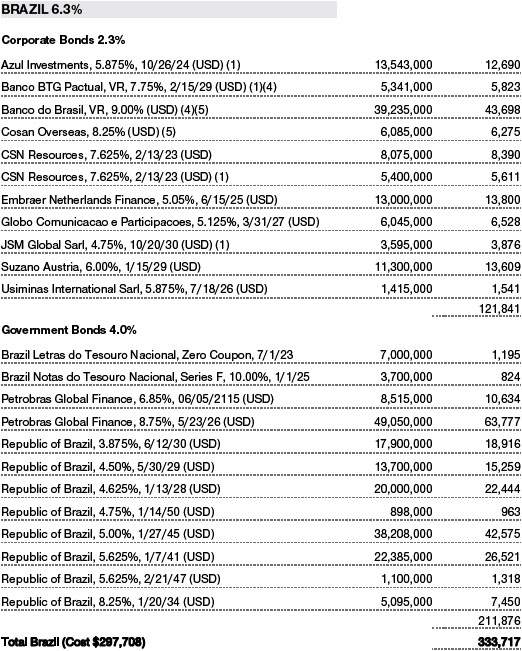
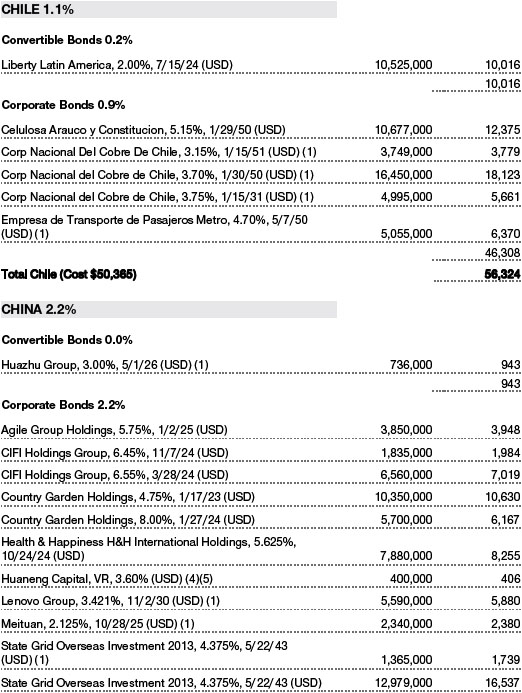
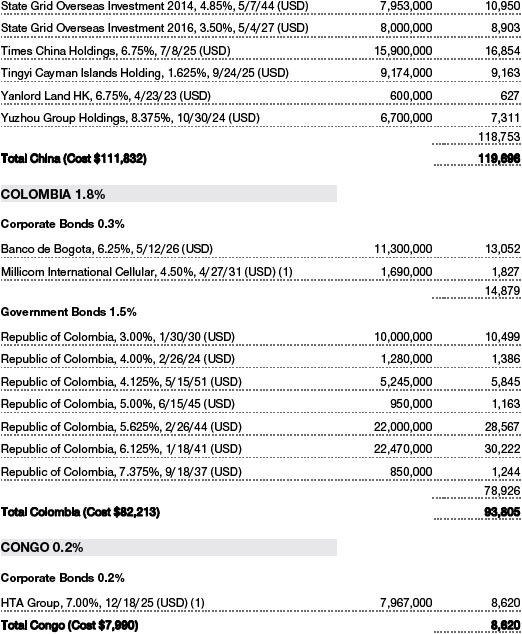
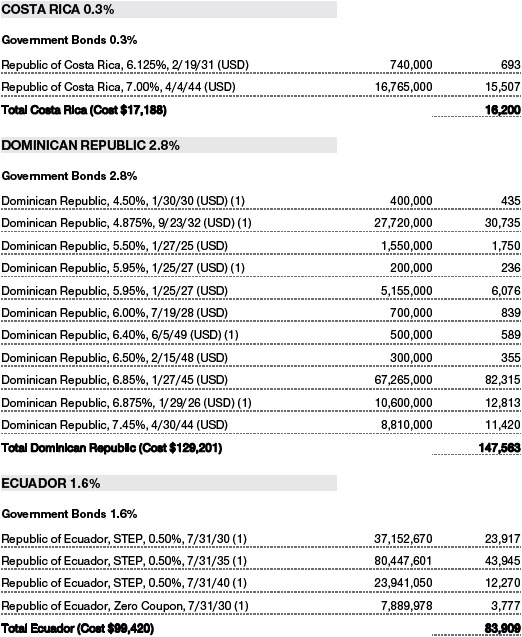
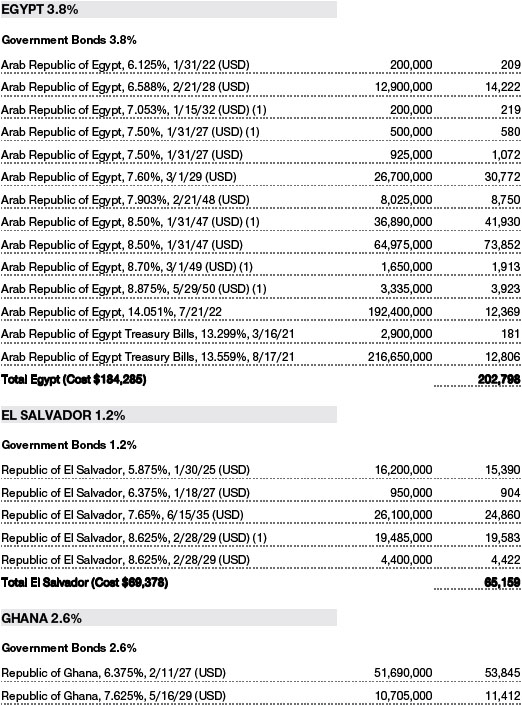
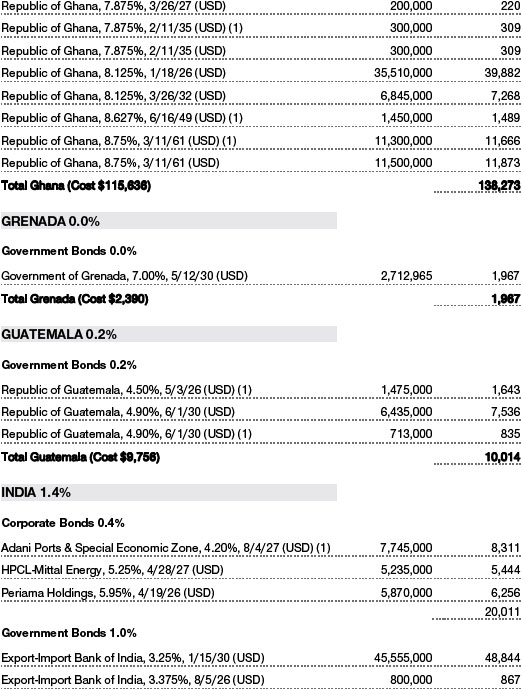
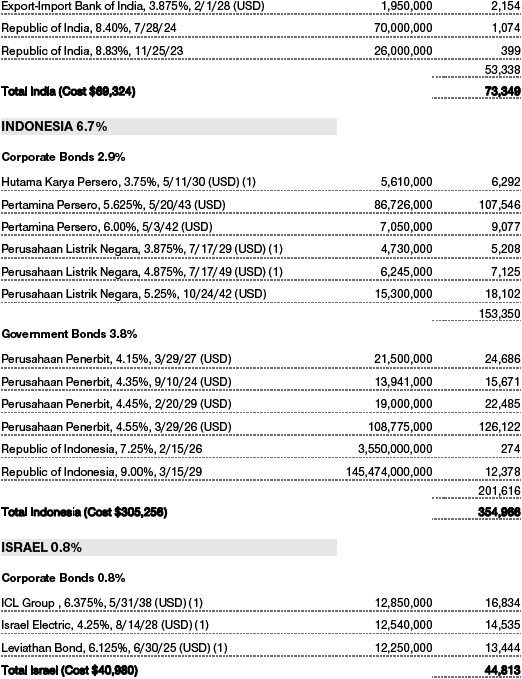
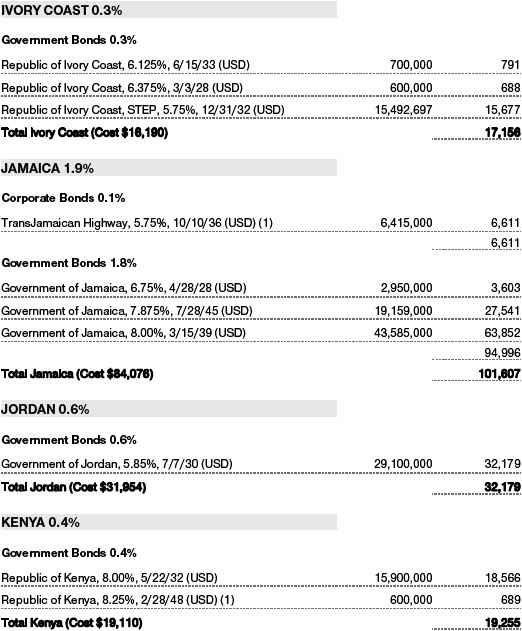
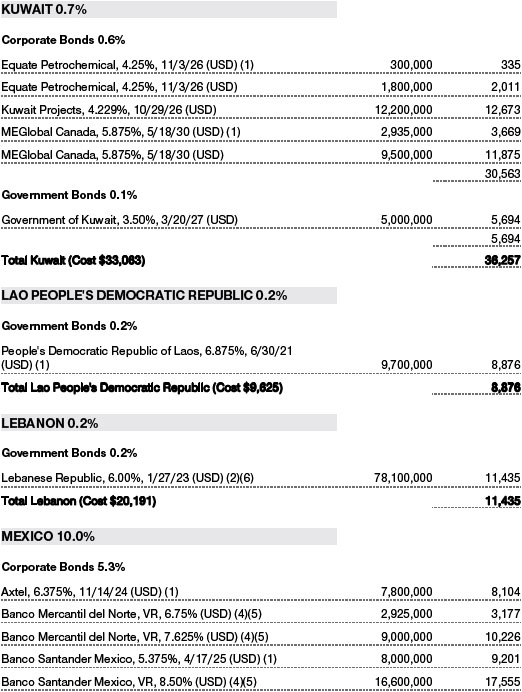
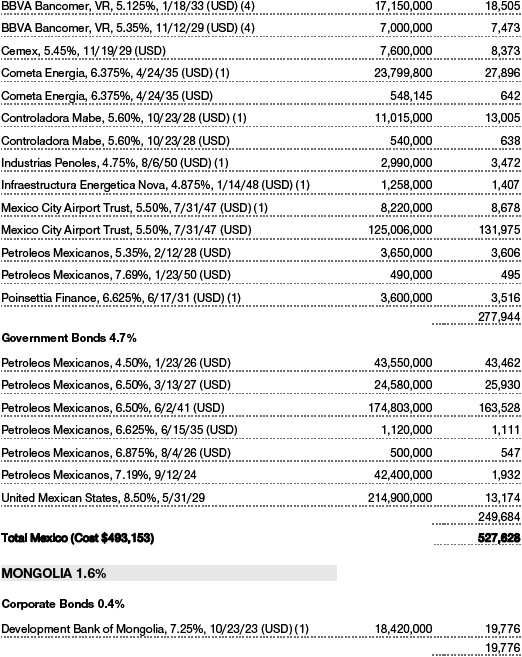
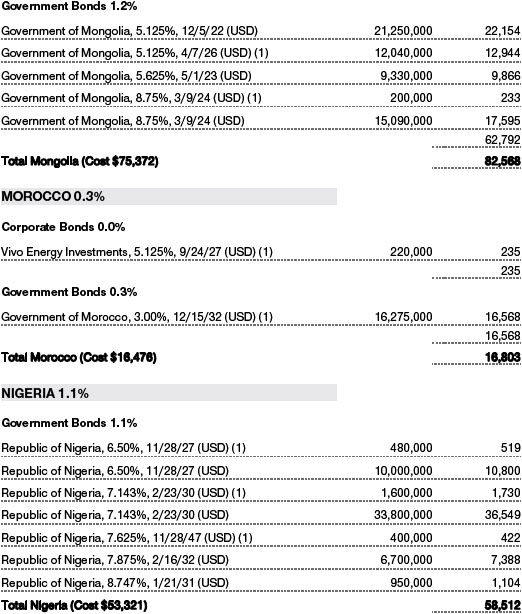
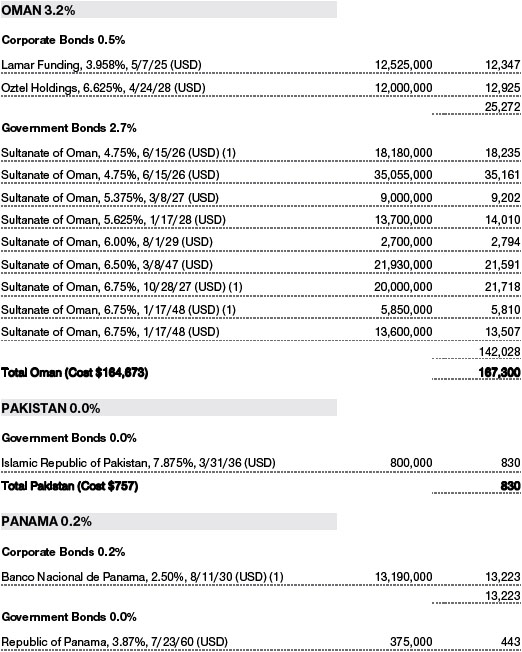
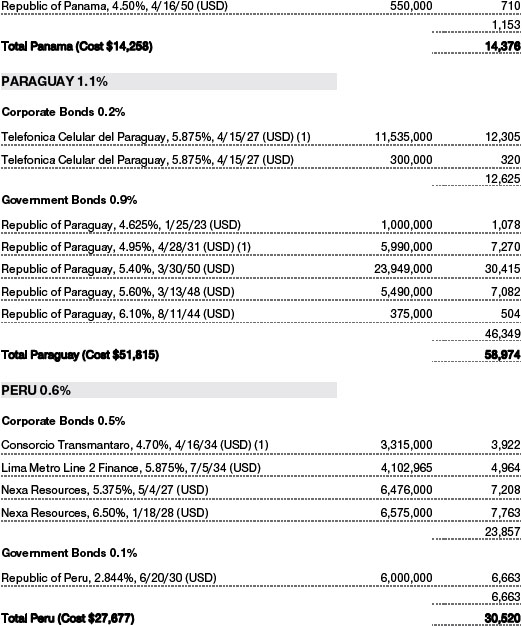
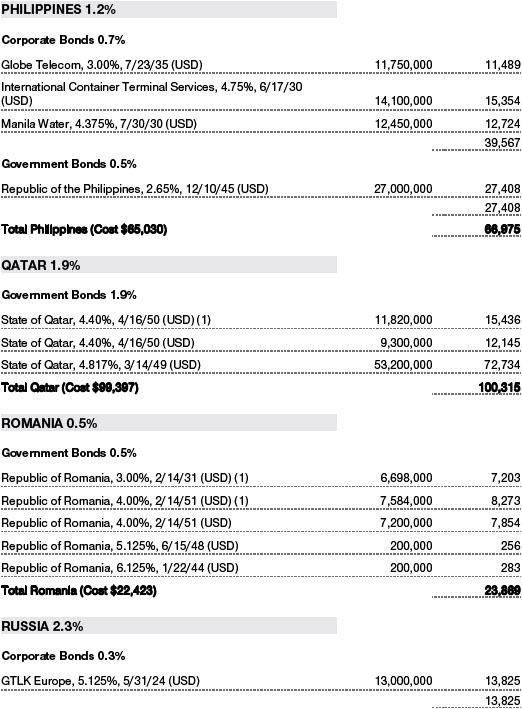
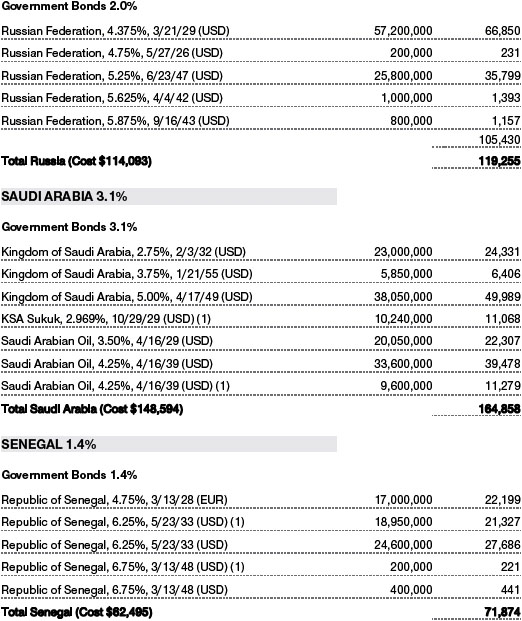
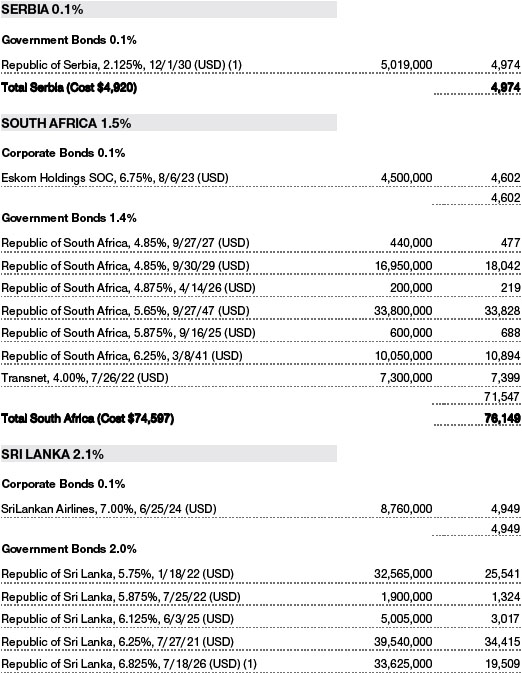
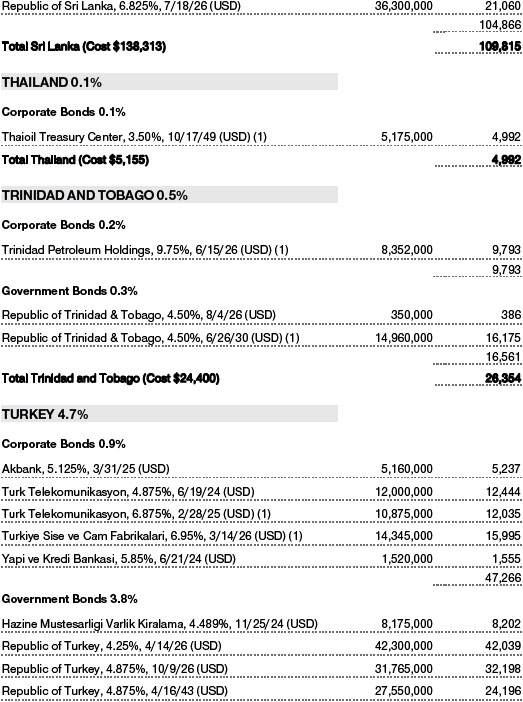
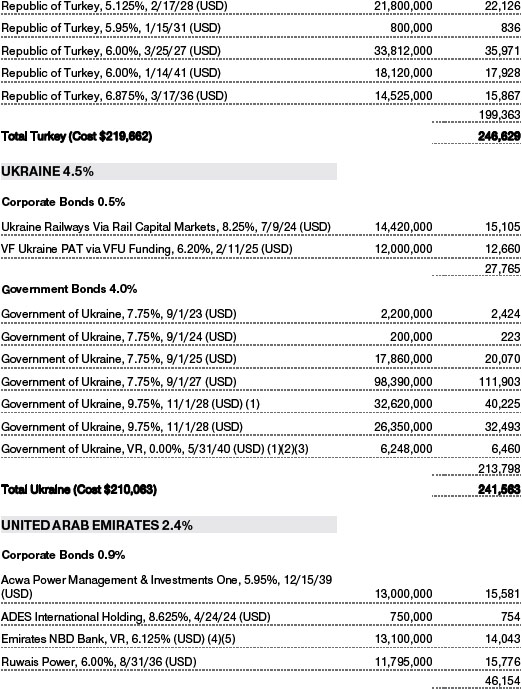
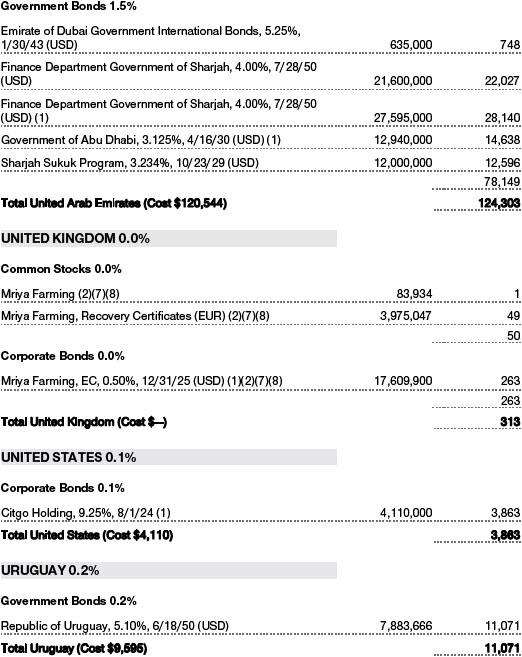
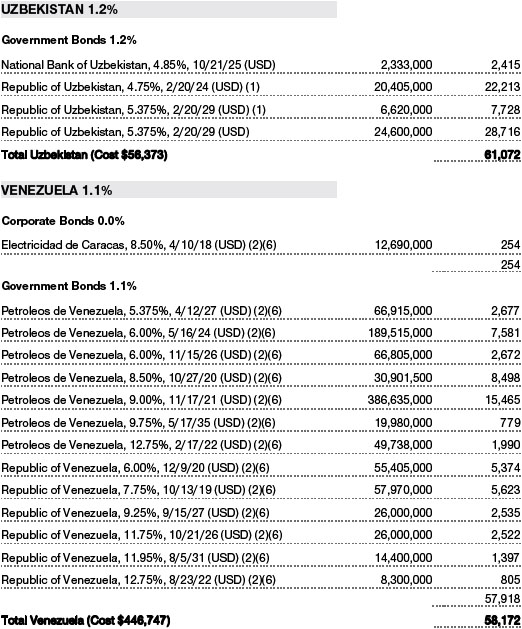
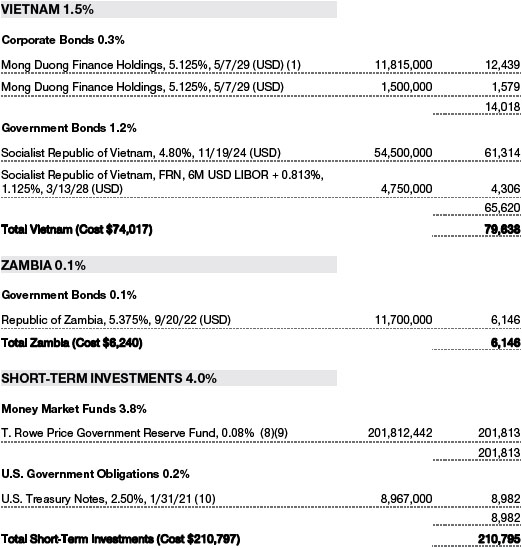
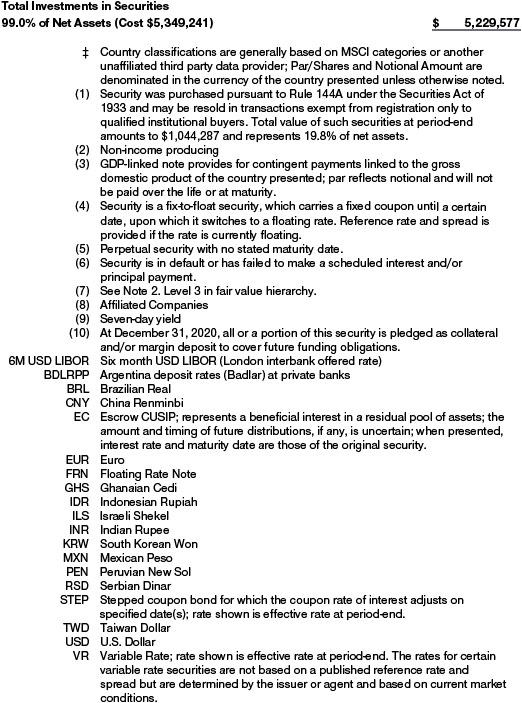
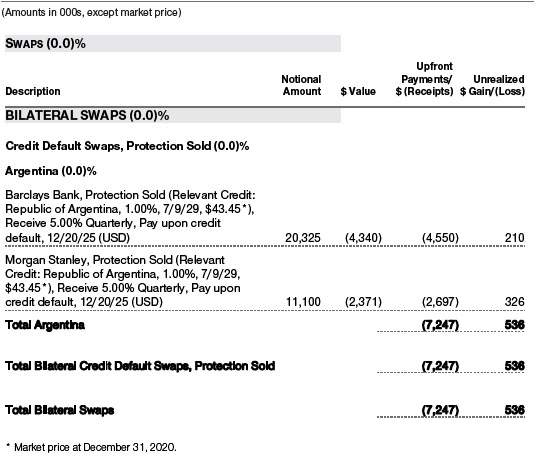
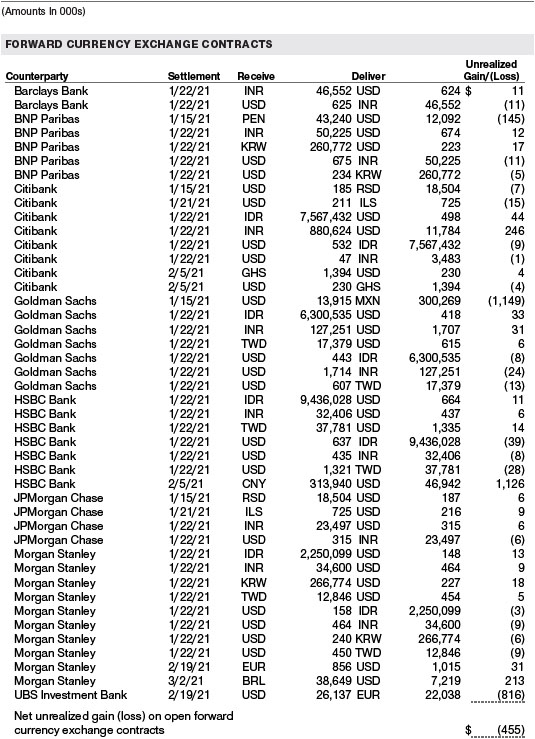
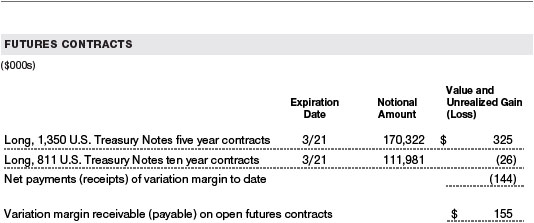
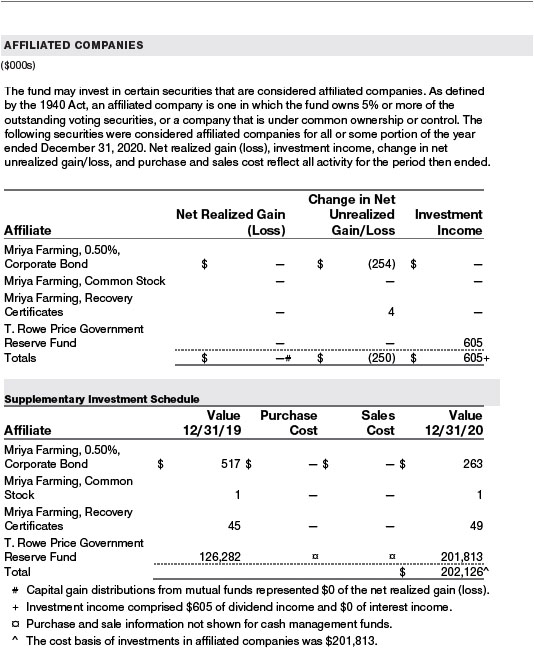
The accompanying notes are an integral part of these financial statements.
December 31, 2020
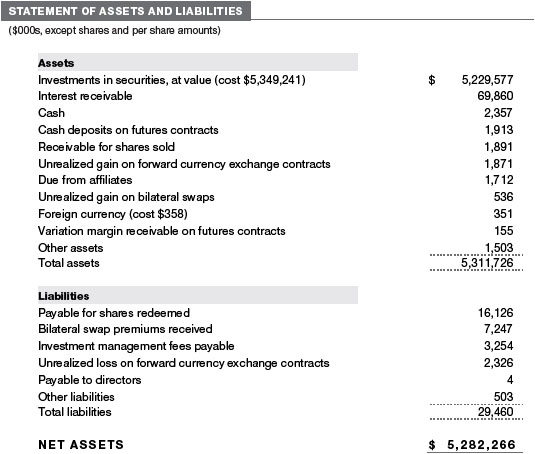
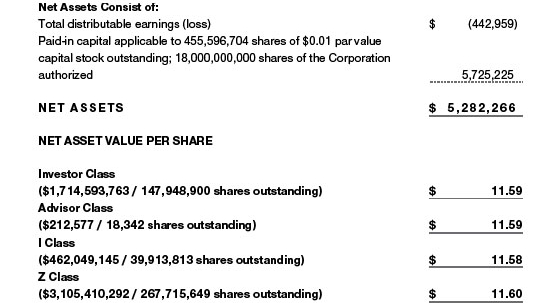
The accompanying notes are an integral part of these financial statements.
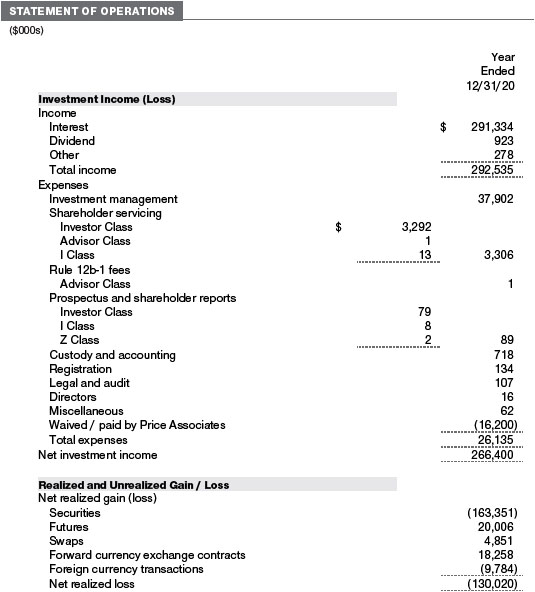

The accompanying notes are an integral part of these financial statements.
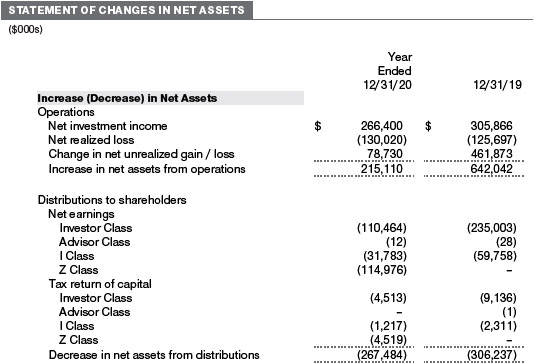
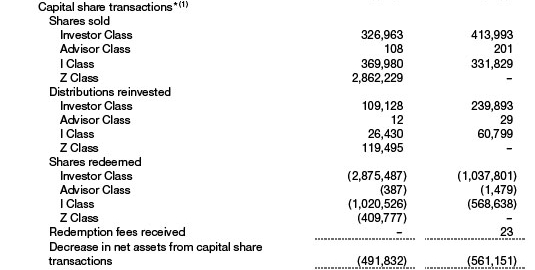
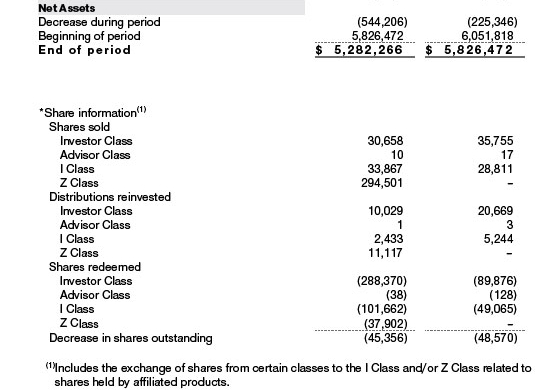
The accompanying notes are an integral part of these financial statements.
| NOTES TO FINANCIAL STATEMENTS |
T. Rowe Price International Funds, Inc. (the corporation) is registered under the Investment Company Act of 1940 (the 1940 Act). The Emerging Markets Bond Fund (the fund) is a nondiversified, open-end management investment company established by the corporation. The fund seeks to provide high income and capital appreciation. The fund has four classes of shares: the Emerging Markets Bond Fund (Investor Class), the Emerging Markets Bond Fund–Advisor Class (Advisor Class), the Emerging Markets Bond Fund–I Class (I Class), and the Emerging Markets Bond Fund–Z Class (Z Class). Advisor Class shares are sold only through various brokers and other financial intermediaries. I Class shares require a $1 million initial investment minimum, although the minimum generally is waived for retirement plans, financial intermediaries, and certain other accounts. The Z Class is only available to funds advised by T. Rowe Price Associates, Inc. and its affiliates and other clients that are subject to a contractual fee for investment management services. The Advisor Class operates under a Board-approved Rule 12b-1 plan pursuant to which the class compensates financial intermediaries for distribution, shareholder servicing, and/or certain administrative services; the Investor, I and Z Classes do not pay Rule 12b-1 fees. Each class has exclusive voting rights on matters related solely to that class; separate voting rights on matters that relate to all classes; and, in all other respects, the same rights and obligations as the other classes.
NOTE 1 - SIGNIFICANT ACCOUNTING POLICIES
Basis of Preparation The fund is an investment company and follows accounting and reporting guidance in the Financial Accounting Standards Board (FASB) Accounting Standards Codification Topic 946 (ASC 946). The accompanying financial statements were prepared in accordance with accounting principles generally accepted in the United States of America (GAAP), including, but not limited to, ASC 946. GAAP requires the use of estimates made by management. Management believes that estimates and valuations are appropriate; however, actual results may differ from those estimates, and the valuations reflected in the accompanying financial statements may differ from the value ultimately realized upon sale or maturity.
Investment Transactions, Investment Income, and Distributions Investment transactions are accounted for on the trade date basis. Income and expenses are recorded on the accrual basis. Realized gains and losses are reported on the identified cost basis. Premiums and discounts on debt securities are amortized for financial reporting purposes. Inflation adjustments to the principal amount of inflation-indexed bonds are reflected as interest income. Income tax-related interest and penalties, if incurred, are recorded as income tax expense. Dividends received from mutual fund investments are reflected as dividend income; capital gain distributions are reflected as realized gain/loss. Dividend income and capital gain distributions are recorded on the ex-dividend date. Non-cash dividends, if any, are recorded at the fair market value of the asset received. Distributions to shareholders are recorded on the ex-dividend date. Income distributions are declared by each class daily and paid monthly. A capital gain distribution may also be declared and paid by the fund annually.
Currency Translation Assets, including investments, and liabilities denominated in foreign currencies are translated into U.S. dollar values each day at the prevailing exchange rate, using the mean of the bid and asked prices of such currencies against U.S. dollars as quoted by a major bank. Purchases and sales of securities, income, and expenses are translated into U.S. dollars at the prevailing exchange rate on the respective date of such transaction. The effect of changes in foreign currency exchange rates on realized and unrealized security gains and losses is not bifurcated from the portion attributable to changes in market prices.
Class Accounting Shareholder servicing, prospectus, and shareholder report expenses incurred by each class are charged directly to the class to which they relate. Expenses common to all classes and investment income are allocated to the classes based upon the relative daily net assets of each class’s settled shares; realized and unrealized gains and losses are allocated based upon the relative daily net assets of each class’s outstanding shares. The Advisor Class pays Rule 12b-1 fees, in an amount not exceeding 0.25% of the class’s average daily net assets.
Redemption Fees Prior to April 1, 2019, a 2% fee was assessed on redemptions of fund shares held for 90 days or less to deter short-term trading and to protect the interests of long-term shareholders. Redemption fees were withheld from proceeds that shareholders received from the sale or exchange of fund shares. The fees were paid to the fund and were recorded as an increase to paid-in capital. The fees may have caused the redemption price per share to differ from the net asset value per share.
Capital Transactions Each investor’s interest in the net assets of the fund is represented by fund shares. The fund’s net asset value (NAV) per share is computed at the close of the New York Stock Exchange (NYSE), normally 4 p.m. ET, each day the NYSE is open for business. However, the NAV per share may be calculated at a time other than the normal close of the NYSE if trading on the NYSE is restricted, if the NYSE closes earlier, or as may be permitted by the SEC. Purchases and redemptions of fund shares are transacted at the next-computed NAV per share, after receipt of the transaction order by T. Rowe Price Associates, Inc., or its agents.
New Accounting Guidance In March 2020, the FASB issued Accounting Standards Update (ASU), ASU 2020-04, Reference Rate Reform (Topic 848) – Facilitation of the Effects of Reference Rate Reform on Financial Reporting, which provides optional, temporary relief with respect to the financial reporting of contracts subject to certain types of modifications due to the planned discontinuation of the London Interbank Offered Rate (LIBOR) and other interbank-offered based reference rates as of the end of 2021. The guidance is effective for certain reference rate-related contract modifications that occur during the period March 12, 2020 through December 31, 2022. Management expects that the adoption of the guidance will not have a material impact on the fund’s financial statements.
Indemnification In the normal course of business, the fund may provide indemnification in connection with its officers and directors, service providers, and/or private company investments. The fund’s maximum exposure under these arrangements is unknown; however, the risk of material loss is currently considered to be remote.
NOTE 2 - VALUATION
In accordance with GAAP, the accompanying financial statements reflect investment values as of the close of the fund’s reporting period on December 31, 2020. In certain circumstances, for example, due to trading in foreign markets or significant events occurring after the close of the NYSE on the last business day of the year, there may be differences in values as of the last business day of the reporting year and values as of the close of the fund’s reporting period on the last calendar day of the year. Accordingly, the NAV per share reflected in the accompanying financial statements may differ from the last transaction price reported elsewhere.
Fair Value The fund’s financial instruments are valued at the close of the NYSE and are reported at fair value, which GAAP defines as the price that would be received to sell an asset or paid to transfer a liability in an orderly transaction between market participants at the measurement date. The T. Rowe Price Valuation Committee (the Valuation Committee) is an internal committee that has been delegated certain responsibilities by the fund’s Board of Directors (the Board) to ensure that financial instruments are appropriately priced at fair value in accordance with GAAP and the 1940 Act. Subject to oversight by the Board, the Valuation Committee develops and oversees pricing-related policies and procedures and approves all fair value determinations. Specifically, the Valuation Committee establishes policies and procedures used in valuing financial instruments, including those which cannot be valued in accordance with normal procedures or using pricing vendors; determines pricing techniques, sources, and persons eligible to effect fair value pricing actions; evaluates the services and performance of the pricing vendors; oversees the pricing process to ensure policies and procedures are being followed; and provides guidance on internal controls and valuation-related matters. The Valuation Committee provides periodic reporting to the Board on valuation matters.
Various valuation techniques and inputs are used to determine the fair value of financial instruments. GAAP establishes the following fair value hierarchy that categorizes the inputs used to measure fair value:
Level 1 – quoted prices (unadjusted) in active markets for identical financial instruments that the fund can access at the reporting date
Level 2 – inputs other than Level 1 quoted prices that are observable, either directly or indirectly (including, but not limited to, quoted prices for similar financial instruments in active markets, quoted prices for identical or similar financial instruments in inactive markets, interest rates and yield curves, implied volatilities, and credit spreads)
Level 3 – unobservable inputs (including the fund’s own assumptions in determining fair value)
Observable inputs are developed using market data, such as publicly available information about actual events or transactions, and reflect the assumptions that market participants would use to price the financial instrument. Unobservable inputs are those for which market data are not available and are developed using the best information available about the assumptions that market participants would use to price the financial instrument. GAAP requires valuation techniques to maximize the use of relevant observable inputs and minimize the use of unobservable inputs. When multiple inputs are used to derive fair value, the financial instrument is assigned to the level within the fair value hierarchy based on the lowest-level input that is significant to the fair value of the financial instrument. Input levels are not necessarily an indication of the risk or liquidity associated with financial instruments at that level but rather the degree of judgment used in determining those values.
Valuation Techniques Debt securities generally are traded in the OTC market and are valued at prices furnished by independent pricing services or by broker dealers who make markets in such securities. When valuing securities, the independent pricing services consider the yield or price of bonds of comparable quality, coupon, maturity, and type, as well as prices quoted by dealers who make markets in such securities.
Equity securities, including exchange-traded funds, listed or regularly traded on a securities exchange or in the over-the-counter (OTC) market are valued at the last quoted sale price or, for certain markets, the official closing price at the time the valuations are made. OTC Bulletin Board securities are valued at the mean of the closing bid and asked prices. A security that is listed or traded on more than one exchange is valued at the quotation on the exchange determined to be the primary market for such security. Listed securities not traded on a particular day are valued at the mean of the closing bid and asked prices for domestic securities and the last quoted sale or closing price for international securities.
The last quoted prices of non-U.S. equity securities may be adjusted to reflect the fair value of such securities at the close of the NYSE, if the fund determines that developments between the close of a foreign market and the close of the NYSE will affect the value of some or all of its portfolio securities. Each business day, the fund uses information from outside pricing services to evaluate and, if appropriate, decide whether it is necessary to adjust quoted prices to reflect fair value by reviewing a variety of factors, including developments in foreign markets, the performance of U.S. securities markets, and the performance of instruments trading in U.S. markets that represent foreign securities and baskets of foreign securities. The fund uses outside pricing services to provide it with quoted prices and information to evaluate or adjust those prices. The fund cannot predict how often it will use quoted prices and how often it will determine it necessary to adjust those prices to reflect fair value.
Investments in mutual funds are valued at the mutual fund’s closing NAV per share on the day of valuation. Futures contracts are valued at closing settlement prices. Forward currency exchange contracts are valued using the prevailing forward exchange rate. Swaps are valued at prices furnished by an independent pricing service or independent swap dealers. Assets and liabilities other than financial instruments, including short-term receivables and payables, are carried at cost, or estimated realizable value, if less, which approximates fair value.
Investments for which market quotations or market-based valuations are not readily available or deemed unreliable are valued at fair value as determined in good faith by the Valuation Committee, in accordance with fair valuation policies and procedures. The objective of any fair value pricing determination is to arrive at a price that could reasonably be expected from a current sale. Financial instruments fair valued by the Valuation Committee are primarily private placements, restricted securities, warrants, rights, and other securities that are not publicly traded. Factors used in determining fair value vary by type of investment and may include market or investment specific considerations. The Valuation Committee typically will afford greatest weight to actual prices in arm’s length transactions, to the extent they represent orderly transactions between market participants, transaction information can be reliably obtained, and prices are deemed representative of fair value. However, the Valuation Committee may also consider other valuation methods such as market-based valuation multiples; a discount or premium from market value of a similar, freely traded security of the same issuer; discounted cash flows; yield to maturity; or some combination. Fair value determinations are reviewed on a regular basis and updated as information becomes available, including actual purchase and sale transactions of the investment. Because any fair value determination involves a significant amount of judgment, there is a degree of subjectivity inherent in such pricing decisions, and fair value prices determined by the Valuation Committee could differ from those of other market participants.
Valuation Inputs The following table summarizes the fund’s financial instruments, based on the inputs used to determine their fair values on December 31, 2020 (for further detail by category, please refer to the accompanying Portfolio of Investments):
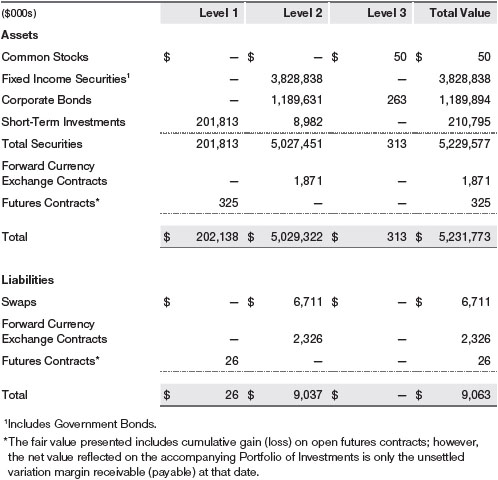
NOTE 3 - DERIVATIVE INSTRUMENTS
During the year ended December 31, 2020, the fund invested in derivative instruments. As defined by GAAP, a derivative is a financial instrument whose value is derived from an underlying security price, foreign exchange rate, interest rate, index of prices or rates, or other variable; it requires little or no initial investment and permits or requires net settlement. The fund invests in derivatives only if the expected risks and rewards are consistent with its investment objectives, policies, and overall risk profile, as described in its prospectus and Statement of Additional Information. The fund may use derivatives for a variety of purposes, such as seeking to hedge against declines in principal value, increase yield, invest in an asset with greater efficiency and at a lower cost than is possible through direct investment, to enhance return, or to adjust portfolio duration and credit exposure. The risks associated with the use of derivatives are different from, and potentially much greater than, the risks associated with investing directly in the instruments on which the derivatives are based. The fund at all times maintains sufficient cash reserves, liquid assets, or other SEC-permitted asset types to cover its settlement obligations under open derivative contracts.
The fund values its derivatives at fair value and recognizes changes in fair value currently in its results of operations. Accordingly, the fund does not follow hedge accounting, even for derivatives employed as economic hedges. Generally, the fund accounts for its derivatives on a gross basis. It does not offset the fair value of derivative liabilities against the fair value of derivative assets on its financial statements, nor does it offset the fair value of derivative instruments against the right to reclaim or obligation to return collateral.
The following table summarizes the fair value of the fund’s derivative instruments held as of December 31, 2020, and the related location on the accompanying Statement of Assets and Liabilities, presented by primary underlying risk exposure:
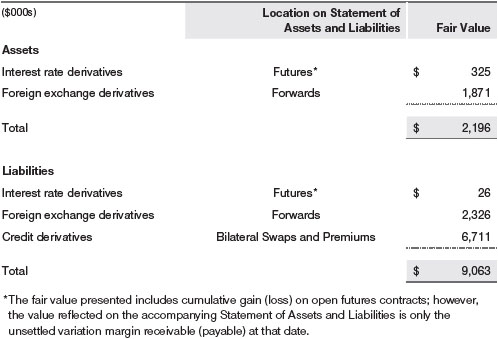
Additionally, the amount of gains and losses on derivative instruments recognized in fund earnings during the year ended December 31, 2020, and the related location on the accompanying Statement of Operations is summarized in the following table by primary underlying risk exposure:
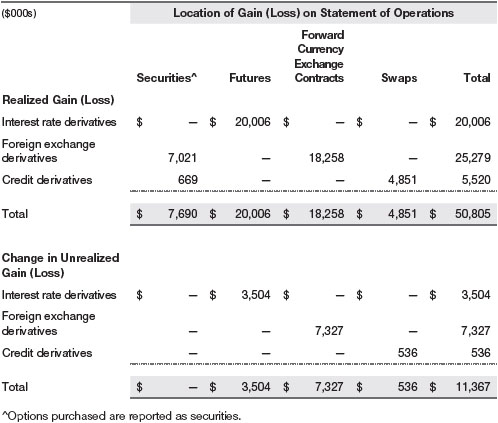
Counterparty Risk and Collateral The fund invests in derivatives in various markets, which expose it to differing levels of counterparty risk. Counterparty risk on exchange-traded and centrally cleared derivative contracts, such as futures, exchange-traded options, and centrally cleared swaps, is minimal because the clearinghouse provides protection against counterparty defaults. For futures and centrally cleared swaps, the fund is required to deposit collateral in an amount specified by the clearinghouse and the clearing firm (margin requirement), and the margin requirement must be maintained over the life of the contract. Each clearinghouse and clearing firm, in its sole discretion, may adjust the margin requirements applicable to the fund.
Derivatives, such as bilateral swaps, forward currency exchange contracts, and OTC options, that are transacted and settle directly with a counterparty (bilateral derivatives) may expose the fund to greater counterparty risk. To mitigate this risk, the fund has entered into master netting arrangements (MNAs) with certain counterparties that permit net settlement under specified conditions and, for certain counterparties, also require the exchange of collateral to cover mark-to-market exposure. MNAs may be in the form of International Swaps and Derivatives Association master agreements (ISDAs) or foreign exchange letter agreements (FX letters).
MNAs provide the ability to offset amounts the fund owes a counterparty against amounts the counterparty owes the fund (net settlement). Both ISDAs and FX letters generally allow termination of transactions and net settlement upon the occurrence of contractually specified events, such as failure to pay or bankruptcy. In addition, ISDAs specify other events, the occurrence of which would allow one of the parties to terminate. For example, a downgrade in credit rating of a counterparty below a specified rating would allow the fund to terminate, while a decline in the fund’s net assets of more than a specified percentage would allow the counterparty to terminate. Upon termination, all transactions with that counterparty would be liquidated and a net termination amount settled. ISDAs include collateral agreements whereas FX letters do not. Collateral requirements are determined daily based on the net aggregate unrealized gain or loss on all bilateral derivatives with a counterparty, subject to minimum transfer amounts that typically range from $100,000 to $250,000. Any additional collateral required due to changes in security values is typically transferred the next business day.
Collateral may be in the form of cash or debt securities issued by the U.S. government or related agencies. Cash posted by the fund is reflected as cash deposits in the accompanying financial statements and generally is restricted from withdrawal by the fund; securities posted by the fund are so noted in the accompanying Portfolio of Investments; both remain in the fund’s assets. Collateral pledged by counterparties is not included in the fund’s assets because the fund does not obtain effective control over those assets. For bilateral derivatives, collateral posted or received by the fund is held in a segregated account at the fund’s custodian. While typically not sold in the same manner as equity or fixed income securities, exchange-traded or centrally cleared derivatives may be closed out only on the exchange or clearinghouse where the contracts were traded, and OTC and bilateral derivatives may be unwound with counterparties or transactions assigned to other counterparties to allow the fund to exit the transaction. This ability is subject to the liquidity of underlying positions. As of December 31, 2020, securities valued at $8,638,000 had been pledged or posted by the fund to counterparties for bilateral derivatives. As of December 31, 2020, collateral pledged by counterparties to the fund for bilateral derivatives consisted of $1,070,000 cash. As of December 31, 2020, cash of $1,913,000 had been posted by the fund for exchange-traded and/or centrally cleared derivatives.
Forward Currency Exchange Contracts The fund is subject to foreign currency exchange rate risk in the normal course of pursuing its investment objectives. It uses forward currency exchange contracts (forwards) primarily to protect its non-U.S. dollar-denominated securities from adverse currency movements and to increase exposure to a particular foreign currency, to shift the fund’s foreign currency exposure from one country to another, or to enhance the fund’s return. A forward involves an obligation to purchase or sell a fixed amount of a specific currency on a future date at a price set at the time of the contract. Although certain forwards may be settled by exchanging only the net gain or loss on the contract, most forwards are settled with the exchange of the underlying currencies in accordance with the specified terms. Forwards are valued at the unrealized gain or loss on the contract, which reflects the net amount the fund either is entitled to receive or obligated to deliver, as measured by the difference between the forward exchange rates at the date of entry into the contract and the forward rates at the reporting date. Appreciated forwards are reflected as assets and depreciated forwards are reflected as liabilities on the accompanying Statement of Assets and Liabilities. Risks related to the use of forwards include the possible failure of counterparties to meet the terms of the agreements; that anticipated currency movements will not occur, thereby reducing the fund’s total return; and the potential for losses in excess of the fund’s initial investment. During the year ended December 31, 2020, the volume of the fund’s activity in forwards, based on underlying notional amounts, was generally between 0% and 4% of net assets.
Futures Contracts The fund is subject to interest rate risk in the normal course of pursuing its investment objectives and uses futures contracts to help manage such risk. The fund may enter into futures contracts to manage exposure to interest rate and yield curve movements, security prices, foreign currencies, credit quality, and mortgage prepayments; as an efficient means of adjusting exposure to all or part of a target market; to enhance income; as a cash management tool; or to adjust portfolio duration and credit exposure. A futures contract provides for the future sale by one party and purchase by another of a specified amount of a specific underlying financial instrument at an agreed-upon price, date, time, and place. The fund currently invests only in exchange-traded futures, which generally are standardized as to maturity date, underlying financial instrument, and other contract terms. Payments are made or received by the fund each day to settle daily fluctuations in the value of the contract (variation margin), which reflect changes in the value of the underlying financial instrument. Variation margin is recorded as unrealized gain or loss until the contract is closed. The value of a futures contract included in net assets is the amount of unsettled variation margin; net variation margin receivable is reflected as an asset and net variation margin payable is reflected as a liability on the accompanying Statement of Assets and Liabilities. Risks related to the use of futures contracts include possible illiquidity of the futures markets, contract prices that can be highly volatile and imperfectly correlated to movements in hedged security values and/or interest rates, and potential losses in excess of the fund’s initial investment. During the year ended December 31, 2020, the volume of the fund’s activity in futures, based on underlying notional amounts, was generally between 2% and 6% of net assets.
Options The fund is subject to foreign currency exchange rate risk and credit risk in the normal course of pursuing its investment objectives and uses options to help manage such risks. The fund may use options to manage exposure to security prices, interest rates, foreign currencies, and credit quality; as an efficient means of adjusting exposure to all or a part of a target market; to enhance income; as a cash management tool; or to adjust credit exposure. Options are included in net assets at fair value, options purchased are included in Investments in Securities, and Options written are separately reflected as a liability on the accompanying Statement of Assets and Liabilities. Premiums on unexercised, expired options are recorded as realized gains or losses; premiums on exercised options are recorded as an adjustment to the proceeds from the sale or cost of the purchase. The difference between the premium and the amount received or paid in a closing transaction is also treated as realized gain or loss. In return for a premium paid, currency options give the holder the right, but not the obligation, to buy and sell currency at a specified exchange rate. Risks related to the use of options include possible illiquidity of the options markets; trading restrictions imposed by an exchange or counterparty; movements in the underlying asset values, currency values and credit ratings and, for options written, potential losses in excess of the fund’s initial investment. During the year ended December 31, 2020, the volume of the fund’s activity in options, based on underlying notional amounts, was generally between 0% and 2% of net assets.
Swaps The fund is subject to credit risk in the normal course of pursuing its investment objectives and uses swap contracts to help manage such risk. The fund may use swaps in an effort to manage both long and short exposure to changes in interest rates, inflation rates, and credit quality; to adjust overall exposure to certain markets; to enhance total return or protect the value of portfolio securities; to serve as a cash management tool; or to adjust portfolio duration and credit exposure. Swap agreements can be settled either directly with the counterparty (bilateral swap) or through a central clearinghouse (centrally cleared swap). Fluctuations in the fair value of a contract are reflected in unrealized gain or loss and are reclassified to realized gain or loss upon contract termination or cash settlement. Net periodic receipts or payments required by a contract increase or decrease, respectively, the value of the contract until the contractual payment date, at which time such amounts are reclassified from unrealized to realized gain or loss. For bilateral swaps, cash payments are made or received by the fund on a periodic basis in accordance with contract terms; unrealized gain on contracts and premiums paid are reflected as assets and unrealized loss on contracts and premiums received are reflected as liabilities on the accompanying Statement of Assets and Liabilities. For bilateral swaps, premiums paid or received are amortized over the life of the swap and are recognized as realized gain or loss in the Statement of Operations. For centrally cleared swaps, payments are made or received by the fund each day to settle the daily fluctuation in the value of the contract (variation margin). Accordingly, the value of a centrally cleared swap included in net assets is the unsettled variation margin; net variation margin receivable is reflected as an asset and net variation margin payable is reflected as a liability on the accompanying Statement of Assets and Liabilities.
Credit default swaps are agreements where one party (the protection buyer) agrees to make periodic payments to another party (the protection seller) in exchange for protection against specified credit events, such as certain defaults and bankruptcies related to an underlying credit instrument, or issuer or index of such instruments. Upon occurrence of a specified credit event, the protection seller is required to pay the buyer the difference between the notional amount of the swap and the value of the underlying credit, either in the form of a net cash settlement or by paying the gross notional amount and accepting delivery of the relevant underlying credit. For credit default swaps where the underlying credit is an index, a specified credit event may affect all or individual underlying securities included in the index and will be settled based upon the relative weighting of the affected underlying security(ies) within the index.
Generally, the payment risk for the seller of protection is inversely related to the current market price or credit rating of the underlying credit or the market value of the contract relative to the notional amount, which are indicators of the markets’ valuation of credit quality. As of December 31, 2020, the notional amount of protection sold by the fund totaled $31,425,000 (0.6% of net assets), which reflects the maximum potential amount the fund could be required to pay under such contracts. Risks related to the use of credit default swaps include the possible inability of the fund to accurately assess the current and future creditworthiness of underlying issuers, the possible failure of a counterparty to perform in accordance with the terms of the swap agreements, potential government regulation that could adversely affect the fund’s swap investments, and potential losses in excess of the fund’s initial investment.
During the year ended December 31, 2020, the volume of the fund’s activity in swaps, based on underlying notional amounts, was generally between 0% and 2% of net assets.
NOTE 4 - OTHER INVESTMENT TRANSACTIONS
Consistent with its investment objective, the fund engages in the following practices to manage exposure to certain risks and/or to enhance performance. The investment objective, policies, program, and risk factors of the fund are described more fully in the fund’s prospectus and Statement of Additional Information.
Emerging and Frontier Markets The fund invests, either directly or through investments in other T. Rowe Price funds, in securities of companies located in, issued by governments of, or denominated in or linked to the currencies of emerging and frontier market countries. Emerging markets, and to a greater extent frontier markets, generally have economic structures that are less diverse and mature, and political systems that are less stable, than developed countries. These markets may be subject to greater political, economic, and social uncertainty and differing regulatory environments that may potentially impact the fund’s ability to buy or sell certain securities or repatriate proceeds to U.S. dollars. Such securities are often subject to greater price volatility, less liquidity, and higher rates of inflation than U.S. securities. Investing in frontier markets is significantly riskier than investing in other countries, including emerging markets.
Noninvestment-Grade Debt The fund invests, either directly or through its investment in other T. Rowe Price funds, in noninvestment-grade debt, including “high yield” or “junk” bonds or leveraged loans. Noninvestment-grade debt issuers are more likely to suffer an adverse change in financial condition that would result in the inability to meet a financial obligation. The noninvestment-grade debt market may experience sudden and sharp price swings due to a variety of factors that may decrease the ability of issuers to make principal and interest payments and adversely affect the liquidity or value, or both, of such securities. Accordingly, securities issued by such companies carry a higher risk of default and should be considered speculative.
Restricted Securities The fund invests in securities that are subject to legal or contractual restrictions on resale. Prompt sale of such securities at an acceptable price may be difficult and may involve substantial delays and additional costs.
LIBOR The fund may invest in instruments that are tied to reference rates, including LIBOR. On July 27, 2017, the United Kingdom’s Financial Conduct Authority announced a decision to transition away from LIBOR by the end of 2021. There remains uncertainty regarding the future utilization of LIBOR and the nature of any replacement rate. Any potential effects of the transition away from LIBOR on the fund, or on certain instruments in which the fund invests, are not known. The transition process may result in, among other things, an increase in volatility or illiquidity of markets for instruments that currently rely on LIBOR, a reduction in the value of certain instruments held by the fund, or a reduction in the effectiveness of related fund transactions such as hedges. Any such effects could have an adverse impact on the fund’s performance.
Other Purchases and sales of portfolio securities other than short-term securities aggregated $2,872,215,000 and $3,393,214,000, respectively, for the year ended December 31, 2020.
NOTE 5 - FEDERAL INCOME TAXES
Generally, no provision for federal income taxes is required since the fund intends to continue to qualify as a regulated investment company under Subchapter M of the Internal Revenue Code and distribute to shareholders all of its taxable income and gains. Distributions determined in accordance with federal income tax regulations may differ in amount or character from net investment income and realized gains for financial reporting purposes.
The fund files U.S. federal, state, and local tax returns as required. The fund’s tax returns are subject to examination by the relevant tax authorities until expiration of the applicable statute of limitations, which is generally three years after the filing of the tax return but which can be extended to six years in certain circumstances. Tax returns for open years have incorporated no uncertain tax positions that require a provision for income taxes.
Financial reporting records are adjusted for permanent book/tax differences to reflect tax character but are not adjusted for temporary differences. The permanent book/tax adjustments have no impact on results of operations or net assets and relate primarily to the recharacterization of distributions and the character of net currency losses. For the year ended December 31, 2020, the following reclassification was recorded:

Distributions during the years ended December 31, 2020 and December 31, 2019, were characterized for tax purposes as follows:

At December 31, 2020, the tax-basis cost of investments, including derivatives, and components of net assets were as follows:
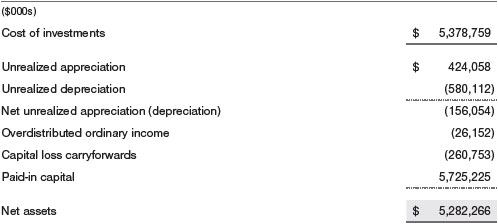
The difference between book-basis and tax-basis net unrealized appreciation (depreciation) is attributable to the deferral of losses from wash sales and the realization of gains/losses on certain open derivative contracts for tax purposes. Tax-basis undistributed ordinary income includes interest income on troubled debt issues that has not been recognized for financial reporting purposes. The fund intends to retain realized gains to the extent of available capital loss carryforwards. Net realized capital losses may be carried forward indefinitely to offset future realized capital gains.
NOTE 6 - RELATED PARTY TRANSACTIONS
The fund is managed by T. Rowe Price Associates, Inc. (Price Associates), a wholly owned subsidiary of T. Rowe Price Group, Inc. (Price Group). The investment management agreement between the fund and Price Associates provides for an annual investment management fee, which is computed daily and paid monthly. The fee consists of an individual fund fee, equal to 0.45% of the fund’s average daily net assets, and a group fee. The group fee rate is calculated based on the combined net assets of certain mutual funds sponsored by Price Associates (the group) applied to a graduated fee schedule, with rates ranging from 0.48% for the first $1 billion of assets to 0.260% for assets in excess of $845 billion. The fund’s group fee is determined by applying the group fee rate to the fund’s average daily net assets. The fee is computed daily and paid monthly. At December 31, 2020, the effective annual group fee rate was 0.28%.
The Advisor Class is subject to a contractual expense limitation through the expense limitation date indicated in the table below. During the limitation period, Price Associates is required to waive its management fee or pay any expenses (excluding interest; expenses related to borrowings, taxes, and brokerage; and other non-recurring expenses permitted by the investment management agreement) that would otherwise cause the class’s ratio of annualized total expenses to average net assets (net expense ratio) to exceed its expense limitation. The class is required to repay Price Associates for expenses previously waived/paid to the extent the class’s net assets grow or expenses decline sufficiently to allow repayment without causing the class’s net expense ratio (after the repayment is taken into account) to exceed the lesser of: (1) the expense limitation in place at the time such amounts were waived; or (2) the class’s current expense limitation. However, no repayment will be made more than three years after the date of a payment or waiver.
The I Class is also subject to an operating expense limitation (I Class Limit) pursuant to which Price Associates is contractually required to pay all operating expenses of the I Class, excluding management fees; interest; expenses related to borrowings, taxes, and brokerage; and other non-recurring expenses permitted by the investment management agreement, to the extent such operating expenses, on an annualized basis, exceed the I Class Limit. This agreement will continue through the expense limitation date indicated in the table below, and may be renewed, revised, or revoked only with approval of the fund’s Board. The I Class is required to repay Price Associates for expenses previously paid to the extent the class’s net assets grow or expenses decline sufficiently to allow repayment without causing the class’s operating expenses (after the repayment is taken into account) to exceed the lesser of: (1) the I Class Limit in place at the time such amounts were paid; or (2) the current I Class Limit. However, no repayment will be made more than three years after the date of a payment or waiver.
The Z Class is also subject to a contractual expense limitation agreement whereby Price Associates has agreed to waive and/or bear all of the Z Class’ expenses (excluding interest; expenses related to borrowings, taxes, and brokerage; and nonrecurring expenses) in their entirety. This fee waiver and/or expense reimbursement arrangement is expected to remain in place indefinitely, and the agreement may only be amended or terminated with approval by the fund’s Board. Expenses of the fund waived/paid by the manager are not subject to later repayment by the fund.
Pursuant to these agreements, expenses were waived/paid by and/or repaid to Price Associates during the year ended December 31, 2020 as indicated in the table below. Including these amounts, expenses previously waived/paid by Price Associates in the amount of $4,000 remain subject to repayment by the fund at December 31, 2020. Any repayment of expenses previously waived/paid by Price Associates during the period would be included in the net investment income and expense ratios presented on the accompanying Financial Highlights.

In addition, the fund has entered into service agreements with Price Associates and two wholly owned subsidiaries of Price Associates, each an affiliate of the fund (collectively, Price). Price Associates provides certain accounting and administrative services to the fund. T. Rowe Price Services, Inc. provides shareholder and administrative services in its capacity as the fund’s transfer and dividend-disbursing agent. T. Rowe Price Retirement Plan Services, Inc. provides subaccounting and recordkeeping services for certain retirement accounts invested in the Investor Class. For the year ended December 31, 2020, expenses incurred pursuant to these service agreements were $68,000 for Price Associates; $785,000 for T. Rowe Price Services, Inc.; and $21,000 for T. Rowe Price Retirement Plan Services, Inc. All amounts due to and due from Price, exclusive of investment management fees payable, are presented net on the accompanying Statement of Assets and Liabilities.
Additionally, the fund is one of several mutual funds in which certain college savings plans managed by Price Associates may invest. As approved by the fund’s Board of Directors, shareholder servicing costs associated with each college savings plan are borne by the fund in proportion to the average daily value of its shares owned by the college savings plan. For the year ended December 31, 2020, the fund was charged $29,000 for shareholder servicing costs related to the college savings plans, of which $25,000 was for services provided by Price. All amounts due to and due from Price, exclusive of investment management fees payable, are presented net on the accompanying Statement of Assets and Liabilities. At December 31, 2020, approximately 4% of the outstanding shares of the I Class were held by college savings plans.
The fund is also one of several mutual funds sponsored by Price Associates (underlying Price Funds) in which the T. Rowe Price Spectrum Funds (Spectrum Funds) and T. Rowe Price Retirement Funds (Retirement Funds) may invest. None of the Spectrum Funds or Retirement Funds invest in the underlying Price Funds for the purpose of exercising management or control. Pursuant to special servicing agreements, expenses associated with the operation of the Spectrum Funds and Retirement Funds are borne by each underlying Price Fund to the extent of estimated savings to it and in proportion to the average daily value of its shares owned by the Spectrum Funds and Retirement Funds. This special servicing agreement between the fund and the Retirement Funds terminated on April 7, 2020.
Expenses allocated under these special servicing agreements are reflected as shareholder servicing expense in the accompanying financial statements. For the year ended December 31, 2020, the fund was allocated $666,000 of Spectrum Funds’ expenses and $936,000 of Retirement Funds’ expenses. Of these amounts, $779,000 related to services provided by Price. All amounts due to and due from Price, exclusive of investment management fees payable, are presented net on the accompanying Statement of Assets and Liabilities. At December 31, 2020, approximately 33% of the outstanding shares of the Investor Class were held by the Spectrum Funds.
In addition, other mutual funds, trusts, and other accounts managed by Price Associates or its affiliates (collectively, Price Funds and accounts) may invest in the fund and are not subject to the special servicing agreements disclosed above. No Price fund or account may invest for the purpose of exercising management or control over the fund. At December 31, 2020, approximately 100% of the Z Class’s outstanding shares were held by Price Funds and accounts.
The fund may invest its cash reserves in certain open-end management investment companies managed by Price Associates and considered affiliates of the fund: the T. Rowe Price Government Reserve Fund or the T. Rowe Price Treasury Reserve Fund, organized as money market funds, or the T. Rowe Price Short-Term Fund, a short-term bond fund (collectively, the Price Reserve Funds). The Price Reserve Funds are offered as short-term investment options to mutual funds, trusts, and other accounts managed by Price Associates or its affiliates and are not available for direct purchase by members of the public. Cash collateral from securities lending is invested in the T. Rowe Price Short-Term Fund. The Price Reserve Funds pay no investment management fees.
The fund may participate in securities purchase and sale transactions with other funds or accounts advised by Price Associates (cross trades), in accordance with procedures adopted by the fund’s Board and Securities and Exchange Commission rules, which require, among other things, that such purchase and sale cross trades be effected at the independent current market price of the security. During the year ended December 31, 2020, the aggregate value of purchases and sales cross trades with other funds or accounts advised by Price Associates was less than 1% of the fund’s net assets as of December 31, 2020.
NOTE 7 - BORROWING
To provide temporary liquidity, the fund may borrow from other T. Rowe Price-sponsored mutual funds under an interfund borrowing program developed and managed by Price Associates. The program permits the borrowing and lending of cash at rates beneficial to both the borrowing and lending funds. Pursuant to program guidelines, loans totaling 10% or more of a borrowing fund’s total assets require collateralization at 102% of the value of the loan; loans of less than 10% are unsecured. During the year ended December 31, 2020, the fund incurred $5,000 in interest expense related to outstanding borrowings on one day in the average amount of $73,200,000 and at an average annual rate of 2.56%. At December 31, 2020, there were no borrowings outstanding.
NOTE 8 - OTHER MATTERS
Unpredictable events such as environmental or natural disasters, war, terrorism, pandemics, outbreaks of infectious diseases, and similar public health threats may significantly affect the economy and the markets and issuers in which a fund invests. Certain events may cause instability across global markets, including reduced liquidity and disruptions in trading markets, while some events may affect certain geographic regions, countries, sectors, and industries more significantly than others, and exacerbate other pre-existing political, social, and economic risks. During 2020, a novel strain of coronavirus (COVID-19) resulted in disruptions to global business activity and caused significant volatility and declines in global financial markets.
These types of events, such as the global pandemic caused by COVID-19, may also cause widespread fear and uncertainty, and result in, among other things: enhanced health screenings, quarantines, cancellations, and travel restrictions, including border closings; disruptions to business operations, supply chains and customer activity; exchange trading suspensions and closures, and overall reduced liquidity of securities, derivatives, and commodities trading markets; reductions in consumer demand and economic output; and significant challenges in healthcare service preparation and delivery. The fund could be negatively impacted if the value of a portfolio holding were harmed by such political or economic conditions or events. In addition, the operations of the fund, its investment advisers, and the fund’s service providers may be significantly impacted, or even temporarily halted, as a result of any impairment to their information technology and other operational systems, extensive employee illnesses or unavailability, government quarantine measures, and restrictions on travel or meetings and other factors related to public emergencies.
Governmental and quasi-governmental authorities and regulators have in the past responded to major economic disruptions with a variety of significant fiscal and monetary policy changes, including but not limited to, direct capital infusions into companies, new monetary programs, and dramatically lower interest rates. An unexpected or quick reversal of these policies, or the ineffectiveness of these policies, could negatively impact overall investor sentiment and further increase volatility in securities markets. The impact of this outbreak has adversely affected the economies of many nations and the entire global economy and may impact individual issuers and capital markets in ways that cannot be foreseen. Other infectious illness outbreaks that may arise in the future could have similar or other unforeseen effects. The duration of this outbreak or others and their effects cannot be determined with certainty.
REPORT OF INDEPENDENT REGISTERED PUBLIC ACCOUNTING FIRM
To the Board of Directors of T. Rowe Price International Funds, Inc. and
Shareholders of T. Rowe Price Emerging Markets Bond Fund
Opinion on the Financial Statements
We have audited the accompanying statement of assets and liabilities, including the portfolio of investments, of T. Rowe Price Emerging Markets Bond Fund (one of the funds constituting T. Rowe Price International Funds, Inc., referred to hereafter as the “Fund”) as of December 31, 2020, the related statement of operations for the year ended December 31, 2020, the statement of changes in net assets for each of the two years in the period ended December 31, 2020, including the related notes, and the financial highlights for each of the periods indicated therein (collectively referred to as the “financial statements”). In our opinion, the financial statements present fairly, in all material respects, the financial position of the Fund as of December 31, 2020, the results of its operations for the year then ended, the changes in its net assets for each of the two years in the period ended December 31, 2020 and the financial highlights for each of the periods indicated therein, in conformity with accounting principles generally accepted in the United States of America.
Basis for Opinion
These financial statements are the responsibility of the Fund’s management. Our responsibility is to express an opinion on the Fund’s financial statements based on our audits. We are a public accounting firm registered with the Public Company Accounting Oversight Board (United States) (PCAOB) and are required to be independent with respect to the Fund in accordance with the U.S. federal securities laws and the applicable rules and regulations of the Securities and Exchange Commission and the PCAOB.
We conducted our audits of these financial statements in accordance with the standards of the PCAOB. Those standards require that we plan and perform the audit to obtain reasonable assurance about whether the financial statements are free of material misstatement, whether due to error or fraud.
Our audits included performing procedures to assess the risks of material misstatement of the financial statements, whether due to error or fraud, and performing procedures that respond to those risks. Such procedures included examining, on a test basis, evidence regarding the amounts and disclosures in the financial statements. Our audits also included evaluating the accounting principles used and significant estimates made by management, as well as evaluating the overall presentation of the financial statements. Our procedures included confirmation of securities owned as of December 31, 2020 by correspondence with the custodians, transfer agent and brokers; when replies were not received from brokers, we performed other auditing procedures. We believe that our audits provide a reasonable basis for our opinion.
PricewaterhouseCoopers LLP
Baltimore, Maryland
February 17, 2021
We have served as the auditor of one or more investment companies in the T. Rowe Price group of investment companies since 1973.
INFORMATION ON PROXY VOTING POLICIES, PROCEDURES, AND RECORDS
A description of the policies and procedures used by T. Rowe Price funds and portfolios to determine how to vote proxies relating to portfolio securities is available in each fund’s Statement of Additional Information. You may request this document by calling 1-800-225-5132 or by accessing the SEC’s website, sec.gov.
The description of our proxy voting policies and procedures is also available on our corporate website. To access it, please visit the following Web page:
https://www.troweprice.com/corporate/en/utility/policies.html
Scroll down to the section near the bottom of the page that says, “Proxy Voting Policies.” Click on the Proxy Voting Policies link in the shaded box.
Each fund’s most recent annual proxy voting record is available on our website and through the SEC’s website. To access it through T. Rowe Price, visit the website location shown above, and scroll down to the section near the bottom of the page that says, “Proxy Voting Records.” Click on the Proxy Voting Records link in the shaded box.
HOW TO OBTAIN QUARTERLY PORTFOLIO HOLDINGS
Effective for reporting periods on or after March 1, 2019, a fund, except a money market fund, files a complete schedule of portfolio holdings with the Securities and Exchange Commission (SEC) for the first and third quarters of each fiscal year as an exhibit to its reports on Form N-PORT. Prior to March 1, 2019, a fund, including a money market fund, filed a complete schedule of portfolio holdings with the SEC for the first and third quarters of each fiscal year on Form N-Q. A money market fund files detailed month-end portfolio holdings information on Form N-MFP with the SEC each month and posts a complete schedule of portfolio holdings on its website (troweprice.com) as of each month-end for the previous six months. A fund’s Forms N-PORT, N-MFP, and N-Q are available electronically on the SEC’s website (sec.gov).
ABOUT THE FUND’S DIRECTORS AND OFFICERS
Your fund is overseen by a Board of Directors (Board) that meets regularly to review a wide variety of matters affecting or potentially affecting the fund, including performance, investment programs, compliance matters, advisory fees and expenses, service providers, and business and regulatory affairs. The Board elects the fund’s officers, who are listed in the final table. At least 75% of the Board’s members are considered to be independent, i.e., not “interested persons” as defined in Section 2(a)(19) of the 1940 Act, of the Boards of T. Rowe Price Associates, Inc. (T. Rowe Price), and its affiliates; “interested” directors and officers are employees of T. Rowe Price. The business address of each director and officer is 100 East Pratt Street, Baltimore, Maryland 21202. The Statement of Additional Information includes additional information about the fund directors and is available without charge by calling a T. Rowe Price representative at 1-800-638-5660.
| INDEPENDENT DIRECTORS(a) | ||
| Name (Year of Birth) Year Elected [Number of T. Rowe Price Portfolios Overseen] |
Principal Occupation(s) and Directorships of Public Companies and Other Investment Companies During the Past Five Years | |
| Teresa Bryce Bazemore (1959) 2018 [190] |
President, Radian Guaranty (2008 to 2017); Chief Executive Officer, Bazemore Consulting LLC (2018 to present); Director, Chimera Investment Corporation (2017 to present); Director, First Industrial Realty Trust (2020 to present); Director, Federal Home Loan Bank of Pittsburgh (2017 to 2019) | |
| Ronald J. Daniels (1959) 2018 [190] |
President, The Johns Hopkins University(b) and Professor, Political Science Department, The Johns Hopkins University (2009 to present); Director, Lyndhurst Holdings (2015 to present); Director, BridgeBio Pharma, Inc. (2020 to present) | |
| Bruce W. Duncan (1951) 2013 [190] |
President, Chief Executive Officer, and Director, CyrusOne, Inc. (2020 to present); Chief Executive Officer and Director (2009 to 2016), Chairman of the Board (2016 to 2020), and President (2009 to 2016), First Industrial Realty Trust, owner and operator of industrial properties; Chairman of the Board (2005 to 2016) and Director (1999 to 2016), Starwood Hotels & Resorts, a hotel and leisure company; Member, Investment Company Institute Board of Governors (2017 to 2019); Member, Independent Directors Council Governing Board (2017 to 2019); Senior Advisor, KKR (2018 to present); Director, Boston Properties (2016 to present); Director, Marriott International, Inc. (2016 to 2020) | |
| Robert J. Gerrard, Jr. (1952) 2012 [190] |
Advisory Board Member, Pipeline Crisis/Winning Strategies, a collaborative working to improve opportunities for young African Americans (1997 to 2016); Chairman of the Board, all funds (since July 2018) | |
| Paul F. McBride (1956) 2013 [190] |
Advisory Board Member, Vizzia Technologies (2015 to present); Board Member, Dunbar Armored (2012 to 2018) | |
| Cecilia E. Rouse, Ph.D. (1963) 2012 [190] |
Dean, Princeton School of Public and International Affairs (2012 to present); Professor and Researcher, Princeton University (1992 to present); Director of Education Studies Committee, MDRC, a nonprofit education and social policy research organization (2011 to 2020); Member, National Academy of Education (2010 to present); Board Member, National Bureau of Economic Research (2011 to present); Board Member of the Council on Foreign Relations (2018 to present); Board Member, The Pennington School (2017 to present); Board Member, the University of Rhode Island (2020 to present); Chair of Committee on the Status of Minority Groups in the Economic Profession of the American Economic Association (2012 to 2018); Vice President (2015 to 2016) and Board Member (2018 to present), American Economic Association | |
| John G. Schreiber (1946) 2001 [190] |
Owner/President, Centaur Capital Partners, Inc., a real estate investment company (1991 to present); Cofounder, Partner, and Cochairman of the Investment Committee, Blackstone Real Estate Advisors, L.P. (1992 to 2015); Director, Blackstone Mortgage Trust, a real estate finance company (2012 to 2016); Director and Chairman of the Board, Brixmor Property Group, Inc. (2013 to present); Director, Hilton Worldwide (2007 to present); Director, Hudson Pacific Properties (2014 to 2016); Director, Invitation Homes (2014 to 2017); Director, JMB Realty Corporation (1980 to present) | |
| (a)All information about the independent directors was current as of December 31, 2019, unless otherwise indicated, except for the number of portfolios overseen, which is current as of the date of this report. | ||
| (b)William J. Stromberg, president and chief executive officer of T. Rowe Price Group, Inc., the parent company of the Price Funds’ investment advisor, has served on the Board of Trustees of Johns Hopkins University since 2014. | ||
| INTERESTED DIRECTORS(a) | ||
| Name (Year of Birth) Year Elected [Number of T. Rowe Price Portfolios Overseen] |
Principal Occupation(s) and Directorships of Public Companies and Other Investment Companies During the Past Five Years | |
| David Oestreicher (1967) 2018 [190] |
General Counsel, Vice President, and Secretary, T. Rowe Price Group, Inc.; Chairman of the Board, Chief Executive Officer, President, and Secretary, T. Rowe Price Trust Company; Director, Vice President, and Secretary, T. Rowe Price, T. Rowe Price Investment Services, Inc., T. Rowe Price Retirement Plan Services, Inc., and T. Rowe Price Services, Inc.; Vice President and Secretary, T. Rowe Price International; Vice President, T. Rowe Price Hong Kong (Price Hong Kong), T. Rowe Price Japan (Price Japan), and T. Rowe Price Singapore (Price Singapore); Principal Executive Officer and Executive Vice President, all funds | |
| Robert W. Sharps, CFA, CPA (1971) 2017 [190] |
Director and Vice President, T. Rowe Price; Vice President, T. Rowe Price Group, Inc., and T. Rowe Price Trust Company; Vice President, International Funds | |
| (a)All information about the interested directors was current as of December 31, 2019, unless otherwise indicated, except for the number of portfolios overseen, which is current as of the date of this report. | ||
| OFFICERS | ||
| Name (Year of Birth) Position Held With International Funds |
Principal Occupation(s) | |
| Mariel Abreu (1981) Vice President |
Vice President, T. Rowe Price and T. Rowe Price Group, Inc. | |
| Jason R. Adams (1979) Executive Vice President |
Vice President T. Rowe Price and T. Rowe Price Group, Inc. | |
| Ulle Adamson, CFA (1979) Executive Vice President |
Vice President, T. Rowe Price Group, Inc., and T. Rowe Price International | |
| Roy H. Adkins (1970) Vice President |
Vice President, T. Rowe Price Group, Inc., and T. Rowe Price International | |
| Christopher D. Alderson (1962) President |
Director and Vice President, T. Rowe Price International; Vice President, Price Hong Kong, Price Singapore, and T. Rowe Price Group, Inc. | |
| Syed H. Ali (1970) Vice President |
Vice President, Price Hong Kong, Price Singapore, and T. Rowe Price Group, Inc. | |
| Kennard W. Allen (1977) Vice President |
Vice President, T. Rowe Price and T. Rowe Price Group, Inc. | |
| Paulina Amieva (1981) Vice President |
Vice President, T. Rowe Price and T. Rowe Price Group, Inc. | |
| Malik S. Asif (1981) Vice President |
Vice President, T. Rowe Price Group, Inc., and T. Rowe Price International | |
| Ziad Bakri, M.D., CFA (1980) Vice President |
Vice President, T. Rowe Price and T. Rowe Price Group, Inc. | |
| Harishankar Balkrishna (1983) Vice President |
Vice President, T. Rowe Price Group, Inc., and T. Rowe Price International | |
| Sheena L. Barbosa (1983) Vice President |
Vice President, Price Hong Kong and T. Rowe Price Group, Inc. | |
| Peter J. Bates, CFA (1974) Executive Vice President |
Vice President, T. Rowe Price and T. Rowe Price Group, Inc. | |
| Jason A. Bauer (1979) Vice President |
Vice President, T. Rowe Price and T. Rowe Price Group, Inc. | |
| Luis M. Baylac (1982) Vice President |
Vice President, T. Rowe Price Group, Inc., and T. Rowe Price International | |
| Oliver D.M. Bell (1969) Executive Vice President |
Vice President, T. Rowe Price Group, Inc., and T. Rowe Price International | |
| R. Scott Berg, CFA (1972) Executive Vice President |
Vice President, T. Rowe Price, T. Rowe Price Group, Inc., and T. Rowe Price Trust Company | |
| Steve E. Boothe, CFA (1977) Vice President |
Vice President, T. Rowe Price and T. Rowe Price Group, Inc. | |
| Peter I. Botoucharov (1965) Vice President |
Vice President, T. Rowe Price Group, Inc., and T. Rowe Price International | |
| Tala Boulos (1984) Vice President |
Vice President, T. Rowe Price Group, Inc., and T. Rowe Price International | |
| Darrell N. Braman (1963) Vice President |
Vice President, Price Hong Kong, Price Singapore, T. Rowe Price, T. Rowe Price Group, Inc., T. Rowe Price International, T. Rowe Price Investment Services, Inc., and T. Rowe Price Services, Inc. | |
| Christopher P. Brown, Jr., CFA (1977) Vice President |
Vice President, T. Rowe Price and T. Rowe Price Group, Inc. | |
| Sheldon Chan (1981) Vice President |
Vice President, Price Hong Kong and T. Rowe Price Group, Inc. | |
| Andrew Chang (1983) Vice President |
Vice President, Price Singapore and T. Rowe Price Group, Inc. | |
| Carolyn Hoi Che Chu (1974) Vice President |
Vice President, Price Hong Kong and T. Rowe Price Group, Inc. | |
| Archibald Ciganer, CFA (1976) Executive Vice President |
Director and Vice President, Price Japan; Vice President, T. Rowe Price Group, Inc. | |
| Richard N. Clattenburg, CFA (1979) Executive Vice President |
Vice President, Price Japan, Price Singapore, T. Rowe Price, T. Rowe Price Group, Inc., T. Rowe Price International, and T. Rowe Price Trust Company | |
| Michael J. Conelius, CFA (1964) Executive Vice President |
Vice President, T. Rowe Price, T. Rowe Price Group, Inc., T. Rowe Price International, and T. Rowe Price Trust Company | |
| Michael F. Connelly, CFA (1977) Vice President |
Vice President, T. Rowe Price and T. Rowe Price Group, Inc. | |
| Andrew S. Davis (1978) Vice President |
Vice President, T. Rowe Price and T. Rowe Price Group, Inc. | |
| Richard de los Reyes (1975) Vice President |
Vice President, T. Rowe Price, T. Rowe Price Group, Inc., and T. Rowe Price Trust Company | |
| Michael Della Vedova (1969) Executive Vice President |
Vice President, T. Rowe Price Group, Inc., and T. Rowe Price International | |
| Iona Dent, CFA (1991) Vice President |
Employee, T. Rowe Price; formerly, Associate, Equity Research, Deutsche Bank (to 2018) | |
| Maria Elena Drew (1973) Vice President |
Vice President, T. Rowe Price Group, Inc., and T. Rowe Price International; formerly, Executive Director, Goldman Sachs Asset Management (to 2017) | |
| Shawn T. Driscoll (1975) Vice President |
Vice President, T. Rowe Price, T. Rowe Price Group, Inc., and T. Rowe Price Trust Company | |
| Alan S. Dupski, CPA (1982) Principal Financial Officer, Vice President, and Treasurer |
Vice President, T. Rowe Price, T. Rowe Price Group, Inc., and T. Rowe Price Trust Company | |
| Bridget A. Ebner (1970) Vice President |
Vice President, T. Rowe Price and T. Rowe Price Group, Inc. | |
| David J. Eiswert, CFA (1972) Executive Vice President |
Vice President, T. Rowe Price and T. Rowe Price Group, Inc. | |
| Dawei Feng (1979) Vice President |
Vice President, Price Hong Kong and T. Rowe Price Group, Inc.; formerly, Head of China Consumer in Equity Research, Credit Lyonnais Asia-Pacific (to 2018) | |
| Ryan W. Ferro (1985) Vice President |
Vice President, T. Rowe Price and T. Rowe Price Group, Inc. | |
| Mark S. Finn, CFA, CPA (1963) Vice President |
Vice President, T. Rowe Price, T. Rowe Price Group, Inc., and T. Rowe Price Trust Company | |
| Quentin S. Fitzsimmons (1968) Vice President |
Vice President, T. Rowe Price Group, Inc., and T. Rowe Price International | |
| Melissa C. Gallagher (1974) Vice President |
Vice President, T. Rowe Price Group, Inc., and T. Rowe Price International | |
| Justin T. Gerbereux, CFA (1975) Vice President |
Vice President, T. Rowe Price, T. Rowe Price Group, Inc., and T. Rowe Price Trust Company | |
| Aaron Gifford, CFA (1987) Vice President |
Vice President, T. Rowe Price and T. Rowe Price Group, Inc.; formerly, Strategist, Morgan Stanley & Co. LLC (to 2017) | |
| John R. Gilner (1961) Chief Compliance Officer |
Chief Compliance Officer and Vice President, T. Rowe Price; Vice President, T. Rowe Price Group, Inc., and T. Rowe Price Investment Services, Inc. | |
| Vishnu V. Gopal (1979) Vice President |
Vice President, Price Hong Kong and T. Rowe Price Group, Inc. | |
| Joel Grant (1978) Vice President |
Vice President, T. Rowe Price and T. Rowe Price Group, Inc. | |
| Gary J. Greb (1961) Vice President |
Vice President, T. Rowe Price, T. Rowe Price International, and T. Rowe Price Trust Company | |
| Paul D. Greene II (1978) Vice President |
Vice President, T. Rowe Price and T. Rowe Price Group, Inc. | |
| Benjamin Griffiths, CFA (1977) Executive Vice President |
Vice President, T. Rowe Price Group, Inc., and T. Rowe Price International | |
| Gianluca Guicciardi (1983) Vice President |
Vice President, T. Rowe Price Group, Inc., and T. Rowe Price International | |
| Richard L. Hall (1979) Vice President |
Vice President, T. Rowe Price and T. Rowe Price Group, Inc. | |
| Nabil Hanano, CFA (1984) Vice President |
Vice President, T. Rowe Price Group, Inc., and T. Rowe Price International | |
| Daniel B. Hirsch, CFA (1985) Vice President |
Vice President, T. Rowe Price and T. Rowe Price Group, Inc. | |
| Jeffrey Holford, Ph.D., ACA (1972) Vice President |
Vice President, T. Rowe Price and T. Rowe Price Group, Inc.; formerly, Managing Director, Jeffries Financial Group (to 2018) | |
| Stefan Hubrich, Ph.D., CFA (1974) Vice President |
Vice President, T. Rowe Price and T. Rowe Price Group, Inc. | |
| Arif Husain, CFA (1972) Executive Vice President |
Vice President, T. Rowe Price Group, Inc., and T. Rowe Price International | |
| Hiromasa Ikeda (1971) Vice President |
Vice President, Price Hong Kong and T. Rowe Price Group, Inc. | |
| Tetsuji Inoue (1971) Vice President |
Vice President, Price Hong Kong, T. Rowe Price Group, Inc., and T. Rowe Price International | |
| Michael D. Jacobs (1971) Vice President |
Vice President, Price Japan, T. Rowe Price Group, Inc., and T. Rowe Price International | |
| Randal S. Jenneke (1971) Vice President |
Vice President, T. Rowe Price Group, Inc. | |
| Prashant G. Jeyaganesh (1983) Vice President |
Vice President, T. Rowe Price and T. Rowe Price Group, Inc. | |
| Nina P. Jones, CPA (1980) Vice President |
Vice President, T. Rowe Price and T. Rowe Price Group, Inc. | |
| Yoichiro Kai (1973) Vice President |
Vice President, Price Singapore, T. Rowe Price Group, Inc., and T. Rowe Price International | |
| Jacob H. Kann, CFA (1987) Vice President |
Vice President, T. Rowe Price and T. Rowe Price Group, Inc. | |
| Jai Kapadia (1982) Vice President |
Vice President, Price Hong Kong and T. Rowe Price Group, Inc. | |
| Andrew J. Keirle (1974) Executive Vice President |
Vice President, T. Rowe Price Group, Inc., and T. Rowe Price International | |
| Takanori Kobayashi (1981) Vice President |
Vice President, Price Japan, T. Rowe Price Group, Inc., and T. Rowe Price International; formerly, Research Analyst, Allianz Global Investors (to 2017) | |
| Paul J. Krug, CPA (1964) Vice President |
Vice President, T. Rowe Price, T. Rowe Price Group, Inc., and T. Rowe Price Trust Company | |
| Christopher J. Kushlis, CFA (1976) Vice President |
Vice President, T. Rowe Price Group, Inc., and T. Rowe Price International | |
| Shengrong Lau (1982) Vice President |
Vice President, Price Singapore and T. Rowe Price Group, Inc. | |
| Mark J. Lawrence (1970) Vice President |
Vice President, T. Rowe Price Group, Inc., and T. Rowe Price International | |
| Jacqueline L. Liu (1979) Vice President |
Vice President, Price Hong Kong and T. Rowe Price Group, Inc. | |
| Johannes Loefstrand (1988) Vice President |
Vice President, T. Rowe Price Group, Inc., and T. Rowe Price International | |
| Anh Lu (1968) Executive Vice President |
Vice President, Price Hong Kong and T. Rowe Price Group, Inc. | |
| Sebastien Mallet (1974) Vice President |
Vice President, T. Rowe Price Group, Inc., and T. Rowe Price International | |
| Jennifer Martin (1972) Vice President |
Vice President, T. Rowe Price and T. Rowe Price Group, Inc. | |
| Ryan Martyn (1979) Vice President |
Vice President, T. Rowe Price Group, Inc., and T. Rowe Price International | |
| Raymond A. Mills, Ph.D., CFA (1960) Executive Vice President |
Vice President, T. Rowe Price, T. Rowe Price Group, Inc., T. Rowe Price International, and T. Rowe Price Trust Company | |
| Jihong Min (1979) Vice President |
Vice President, Price Singapore and T. Rowe Price Group, Inc. | |
| Eric C. Moffett (1974) Executive Vice President |
Vice President, Price Hong Kong and T. Rowe Price Group, Inc. | |
| Ivan Morozov, CFA (1987) Vice President |
Vice President, T. Rowe Price Group, Inc., and T. Rowe Price International | |
| Samy B. Muaddi, CFA (1984) Executive Vice President |
Vice President, T. Rowe Price and T. Rowe Price Group, Inc. | |
| Tobias F. Mueller, CFA (1980) Executive Vice President |
Vice President, T. Rowe Price Group, Inc., and T. Rowe Price International | |
| Joshua Nelson (1977) Executive Vice President |
Vice President, T. Rowe Price, T. Rowe Price Group, Inc., T. Rowe Price International, and T. Rowe Price Trust Company | |
| Philip A. Nestico (1976) Vice President |
Vice President, T. Rowe Price and T. Rowe Price Group, Inc. | |
| Michael Niedzielski (1979) Vice President |
Vice President T. Rowe Price Group, Inc., and T. Rowe Price International | |
| Sridhar Nishtala (1975) Vice President |
Director and Vice President, Price Singapore; Vice President, T. Rowe Price Group, Inc. | |
| Jason Nogueira, CFA (1974) Executive Vice President |
Vice President, T. Rowe Price and T. Rowe Price Group, Inc. | |
| Kenneth A. Orchard (1975) Executive Vice President |
Vice President, T. Rowe Price Group, Inc., and T. Rowe Price International | |
| Curt J. Organt, CFA (1968) Vice President |
Vice President, T. Rowe Price and T. Rowe Price Group, Inc. | |
| Paul T. O’Sullivan (1973) Vice President |
Vice President, T. Rowe Price Group, Inc., and T. Rowe Price International | |
| Oluwaseun A. Oyegunle, CFA (1984) Vice President |
Vice President, T. Rowe Price Group, Inc., and T. Rowe Price International | |
| Gonzalo Pángaro, CFA (1968) Executive Vice President |
Vice President, T. Rowe Price Group, Inc., and T. Rowe Price International | |
| Fran M. Pollack-Matz (1961) Vice President and Secretary |
Vice President, T. Rowe Price and T. Rowe Price Group, Inc. | |
| Vivek Rajeswaran (1985) Vice President |
Vice President, T. Rowe Price and T. Rowe Price Group, Inc. | |
| Shannon H. Rauser (1987) Assistant Secretary |
Assistant Vice President, T. Rowe Price | |
| Todd Reese (1990) Vice President |
Employee, T. Rowe Price; formerly, Investment Analyst, Trian Fund Management (to 2016) | |
| Melanie A. Rizzo (1982) Vice President |
Vice President, T. Rowe Price and T. Rowe Price Group, Inc. | |
| David L. Rowlett, CFA (1975) Vice President |
Vice President, T. Rowe Price and T. Rowe Price Group, Inc. | |
| Federico Santilli, CFA (1974) Executive Vice President |
Vice President, T. Rowe Price Group, Inc., and T. Rowe Price International | |
| Nikolaj Schmidt (1975) Vice President |
Vice President, T. Rowe Price Group, Inc., and T. Rowe Price International | |
| Sebastian Schrott (1977) Vice President |
Vice President, T. Rowe Price Group, Inc., and T. Rowe Price International | |
| Bin Shen, CFA (1987) Vice President |
Vice President, T. Rowe Price International | |
| John C.A. Sherman (1969) Vice President |
Vice President, T. Rowe Price and T. Rowe Price Group, Inc. | |
| Gabriel Solomon (1977) Vice President |
Vice President, T. Rowe Price and T. Rowe Price Group, Inc. | |
| Scott D. Solomon, CFA (1981) Vice President |
Vice President, T. Rowe Price and T. Rowe Price Group, Inc. | |
| Joshua K. Spencer, CFA (1973) Vice President |
Vice President, T. Rowe Price, T. Rowe Price Group, Inc., and T. Rowe Price Trust Company | |
| David Stanley (1963) Vice President |
Vice President, T. Rowe Price Group, Inc., and T. Rowe Price International | |
| Saurabh Sud, CFA (1985) Executive Vice President |
Vice President, T. Rowe Price and T. Rowe Price Group, Inc.; formerly, Senior Vice President, PIMCO (to 2018) | |
| Taymour R. Tamaddon, CFA (1976) Vice President |
Vice President, T. Rowe Price, T. Rowe Price Group, Inc., and T. Rowe Price Trust Company | |
| Ju Yen Tan (1972) Vice President |
Vice President, T. Rowe Price Group, Inc., and T. Rowe Price International | |
| Sin Dee Tan, CFA (1979) Vice President |
Vice President, T. Rowe Price Group, Inc., and T. Rowe Price International | |
| Dean Tenerelli (1964) Executive Vice President |
Vice President, T. Rowe Price Group, Inc., and T. Rowe Price International | |
| Siby Thomas (1979) Vice President |
Vice President, T. Rowe Price and T. Rowe Price Group, Inc. | |
| Justin Thomson (1968) Executive Vice President |
Vice President, T. Rowe Price Group, Inc., and T. Rowe Price International | |
| Mark J. Vaselkiv (1958) Executive Vice President |
Vice President, T. Rowe Price, T. Rowe Price Group, Inc., and T. Rowe Price Trust Company | |
| Rupinder Vig (1979) Vice President |
Vice President, T. Rowe Price Group, Inc., and T. Rowe Price International; formerly, Partner, Egerton Capital (to 2016) | |
| Willem Visser (1979) Vice President |
Vice President, T. Rowe Price Group, Inc., and T. Rowe Price International; formerly, Investment Analyst, NN Investment Partners (to 2017) | |
| Chris Vost (1989) Vice President |
Vice President, T. Rowe Price Group, Inc., and T. Rowe Price International | |
| Zenon Voyiatzis (1971) Vice President |
Vice President, T. Rowe Price Group, Inc., and T. Rowe Price International | |
| Verena E. Wachnitz, CFA (1978) Executive Vice President |
Vice President, T. Rowe Price Group, Inc., and T. Rowe Price International | |
| David J. Wallack (1960) Vice President |
Vice President, T. Rowe Price, T. Rowe Price Group, Inc., and T. Rowe Price Trust Company | |
| Dai Wang (1989) Vice President |
Vice President, Price Hong Kong and T. Rowe Price Group, Inc. | |
| Megan Warren (1968) Vice President |
Vice President, T. Rowe Price, T. Rowe Price Group, Inc., T. Rowe Price Retirement Plan Services, Inc., T. Rowe Price Services, Inc., and T. Rowe Price Trust Company; formerly, Executive Director, JPMorgan Chase (to 2017) | |
| Hiroshi Watanabe, CFA (1975) Vice President |
Director and Vice President, Price Japan; Vice President, T. Rowe Price Group, Inc. | |
| Clive M. Williams (1966) Vice President |
Vice President, Price Hong Kong, Price Singapore, T. Rowe Price, T. Rowe Price Group, Inc., and T. Rowe Price International | |
| J. Howard Woodward, CFA (1974) Vice President |
Vice President, T. Rowe Price Group, Inc., and T. Rowe Price International | |
| Marta Yago (1977) Vice President |
Vice President, T. Rowe Price Group, Inc., and T. Rowe Price International | |
| Benjamin T. Yeagle (1978) Vice President |
Vice President, T. Rowe Price and T. Rowe Price Group, Inc. | |
| Ernest C. Yeung, CFA (1979) Executive Vice President |
Director and Vice President, Price Hong Kong; Vice President, T. Rowe Price Group, Inc. | |
| Alison Mei Ling Yip (1966) Vice President |
Vice President, Price Hong Kong and T. Rowe Price Group, Inc. | |
| Eric Yuan (1984) Vice President |
Vice President, Price Hong Kong and T. Rowe Price Group, Inc.; formerly, student, Columbia Business School (to 2016) | |
| Wenli Zheng (1979) Vice President |
Vice President, Price Hong Kong and T. Rowe Price Group, Inc. | |
Unless otherwise noted, officers have been employees of T. Rowe Price or T. Rowe Price International for at least 5 years.
Item 1. (b) Notice pursuant to Rule 30e-3.
Not applicable.
Item 2. Code of Ethics.
The registrant has adopted a code of ethics, as defined in Item 2 of Form N-CSR, applicable to its principal executive officer, principal financial officer, principal accounting officer or controller, or persons performing similar functions. A copy of this code of ethics is filed as an exhibit to this Form N-CSR. No substantive amendments were approved or waivers were granted to this code of ethics during the period covered by this report.
Item 3. Audit Committee Financial Expert.
The registrant’s Board of Directors/Trustees has determined that Mr. Bruce W. Duncan qualifies as an audit committee financial expert, as defined in Item 3 of Form N-CSR. Mr. Duncan is considered independent for purposes of Item 3 of Form N-CSR.
Item 4. Principal Accountant Fees and Services.
(a) – (d) Aggregate fees billed for the last two fiscal years for professional services rendered to, or on behalf of, the registrant by the registrant’s principal accountant were as follows:

Audit fees include amounts related to the audit of the registrant’s annual financial statements and services normally provided by the accountant in connection with statutory and regulatory filings. Audit-related fees include amounts reasonably related to the performance of the audit of the registrant’s financial statements and specifically include the issuance of a report on internal controls and, if applicable, agreed-upon procedures related to fund acquisitions. Tax fees include amounts related to services for tax compliance, tax planning, and tax advice. The nature of these services specifically includes the review of distribution calculations and the preparation of Federal, state, and excise tax returns. All other fees include the registrant’s pro-rata share of amounts for agreed-upon procedures in conjunction with service contract approvals by the registrant’s Board of Directors/Trustees.
(e)(1) The registrant’s audit committee has adopted a policy whereby audit and non-audit services performed by the registrant’s principal accountant for the registrant, its investment adviser, and any entity controlling, controlled by, or under common control with the investment adviser that provides ongoing services to the registrant require pre-approval in advance at regularly scheduled audit committee meetings. If such a service is required between regularly scheduled audit committee meetings, pre-approval may be authorized by one audit committee member with ratification at the next scheduled audit committee meeting. Waiver of pre-approval for audit or non-audit services requiring fees of a de minimis amount is not permitted.
(2) No services included in (b) – (d) above were approved pursuant to paragraph (c)(7)(i)(C) of Rule 2-01 of Regulation S-X.
(f) Less than 50 percent of the hours expended on the principal accountant’s engagement to audit the registrant’s financial statements for the most recent fiscal year were attributed to work performed by persons other than the principal accountant’s full-time, permanent employees.
(g) The aggregate fees billed for the most recent fiscal year and the preceding fiscal year by the registrant’s principal accountant for non-audit services rendered to the registrant, its investment adviser, and any entity controlling, controlled by, or under common control with the investment adviser that provides ongoing services to the registrant were $3,781,000 and $3,227,000, respectively.
(h) All non-audit services rendered in (g) above were pre-approved by the registrant’s audit committee. Accordingly, these services were considered by the registrant’s audit committee in maintaining the principal accountant’s independence.
Item 5. Audit Committee of Listed Registrants.
Not applicable.
Item 6. Investments.
(a) Not applicable. The complete schedule of investments is included in Item 1 of this Form N-CSR.
(b) Not applicable.
Item 7. Disclosure of Proxy Voting Policies and Procedures for Closed-End Management Investment Companies.
Not applicable.
Item 8. Portfolio Managers of Closed-End Management Investment Companies.
Not applicable.
Item 9. Purchases of Equity Securities by Closed-End Management Investment Company and Affiliated Purchasers.
Not applicable.
Item 10. Submission of Matters to a Vote of Security Holders.
There has been no change to the procedures by which shareholders may recommend nominees to the registrant’s board of directors.
Item 11. Controls and Procedures.
(a) The registrant’s principal executive officer and principal financial officer have evaluated the registrant’s disclosure controls and procedures within 90 days of this filing and have concluded that the registrant’s disclosure controls and procedures were effective, as of that date, in ensuring that information required to be disclosed by the registrant in this Form N-CSR was recorded, processed, summarized, and reported timely.
(b) The registrant’s principal executive officer and principal financial officer are aware of no change in the registrant’s internal control over financial reporting that occurred during the period covered by this report that has materially affected, or is reasonably likely to materially affect, the registrant’s internal control over financial reporting.
Item 12. Disclosure of Securities Lending Activities for Closed-End Management Investment Companies.
Not applicable.
Item 13. Exhibits.
(a)(1) The registrant’s code of ethics pursuant to Item 2 of Form N-CSR is attached.
(3) Written solicitation to repurchase securities issued by closed-end companies: not applicable.
SIGNATURES
Pursuant to the requirements of the Securities Exchange Act of 1934 and the Investment Company Act of 1940, the registrant has duly caused this report to be signed on its behalf by the undersigned, thereunto duly authorized.
T. Rowe Price International Funds, Inc.
| By | /s/ David Oestreicher | |||||
| David Oestreicher | ||||||
| Principal Executive Officer | ||||||
| Date | February 17, 2021 | |||||
Pursuant to the requirements of the Securities Exchange Act of 1934 and the Investment Company Act of 1940, this report has been signed below by the following persons on behalf of the registrant and in the capacities and on the dates indicated.
| By | /s/ David Oestreicher | |||||
| David Oestreicher | ||||||
| Principal Executive Officer | ||||||
| Date | February 17, 2021 | |||||
| By | /s/ Alan S. Dupski | |||||
| Alan S. Dupski | ||||||
| Principal Financial Officer | ||||||
| Date | February 17, 2021 | |||||